
The affordability of
private renting for
families claiming local
housing allowance
From the Shelter policy library
July 2012
www.shelter.org.uk
© 2012 Shelter. All rights reserved. This document is only for your personal, non-commercial use.
You may not copy, reproduce, republish, post, distribute, transmit or modify it in any way.
This document contains information and policies that were correct at the time of publication.
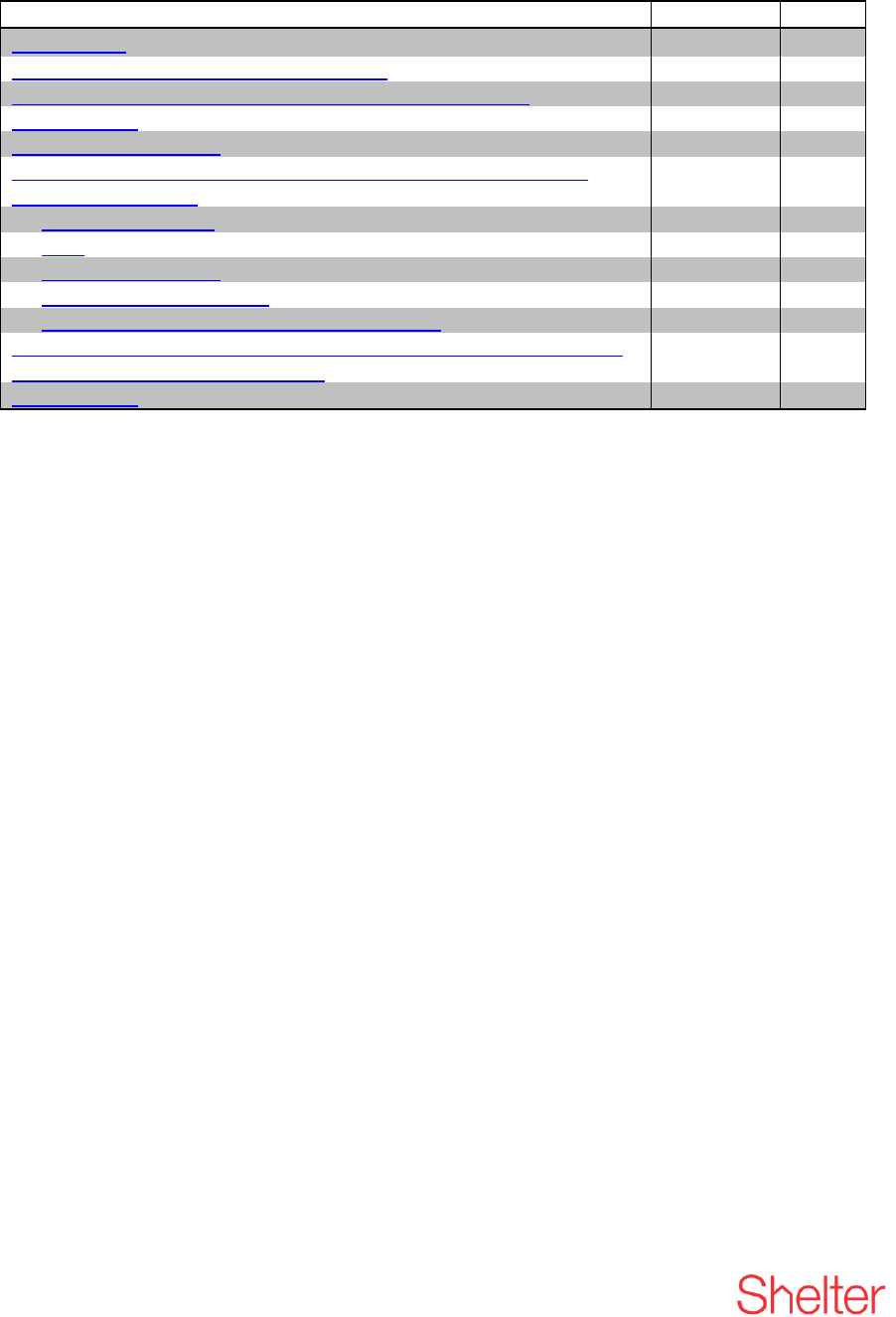
The affordability of private renting – small families claiming local housing allowance
DOWNLOADED FROM THE SHELTER WEBSITE www.shelter.org.uk
© 2012 Shelter
2
Contents
Title
Page
Fig.
Introduction
3
Who claims Local Housing Allowance?
4
Summary of the changes to Local Housing Allowance
5
Key Findings
6
Methods and sources
8
Main Findings: Affordability for small families claiming Local
Housing Allowance
11
National overview
11
1
Map
12
2
Regional overview
13
3
Local authority analysis
14
4&5
Affordability and urban rural classification
17
6
Advice needs: Largely unaffordable areas with high proportions
of privately renting HB claimants
18
7
Annex tables
20

The affordability of private renting – small families claiming local housing allowance
DOWNLOADED FROM THE SHELTER WEBSITE www.shelter.org.uk
© 2012 Shelter
3
Introduction
In the 2010 Emergency Budget the Coalition Government announced a series of changes to
housing benefit, most of which affect private renters claiming local housing allowance (LHA). The
element of these changes that will impact the most claimants is the setting of LHA rates at the
30
th
percentile of rents, from the 50
th
, which will mean an estimated 775,000 existing claimants
losing an average of £9 per week
1
. In practice losses will depend on the distribution of rents in
each local area and claimants in inner London will also be affected by the more restrictive LHA
caps
2
.
The Government announced in November 2010 that existing LHA claimants would have nine
months “transitional protection” from the LHA cuts. As LHA claims are reviewed on a staggered,
individual basis, this means that most existing claimants will be affected between January and
December 2012. New claimants have been restricted to the lower LHA rates since April 2011.
The number of LHA claimants has been increasing alongside the difficult economic conditions
and there has been a particular rise in the numbers of working claimants. The number of LHA
claimants has increased from just over 900,000 claimants in January 2010 to 1,285,000 in
January 2012
3
. At the same time restrictions on mortgage finance have increased demand for
private rented housing across all income bands. As a result rents have been rising, with 7%
inflation to rents in London in 2011
4
.
Growth in the private rented sector has not been restricted to traditionally more mobile
households such as students and young professionals; instead the number of families with
children renting privately has grown disproportionately. Over a million families with children are
renting privately and this has nearly doubled in the last five years
5
. Close to half (48%) of
households claiming LHA include dependents in the household
6
.
This research compares the affordability of the cheapest quarter of local rents with maximum
LHA payable in each local authority area in England, at the time of the introduction of the recent
changes to the system
7
. The report then highlights the areas with the highest proportions of
claimants. This is intended to help identify areas where the need for advice and information
following the changes to LHA is most likely to be greatest.
Access to good quality housing advice and information is highly valued and improves the housing
outcomes of the majority of those receiving it, often avoiding costly episodes of homelessness
8
.
However, capacity for providing this help is extremely stretched, so it is vital that resources are
targeted towards the families and areas with the greatest need. We hope that this report
becomes a useful tool in achieving this aim.
1
DWP, Impacts of Housing Benefit proposals: Changes to LHA to be introduced in 2011-12, July 2010.
2
LHA cannot exceed £250 for a 1 bedroom home; £290 for a 2 bedroom home; £340 for a 3 bedroom
home and £400 for a 4 bedroom home.
3
http://research.dwp.gov.uk/asd/index.php?page=hbctb.The rise in LHA claimants is partly due to the
migration of private rented claimants claiming under the historic Housing Benefit system onto LHA which
began in 2008.
4
London Rent Watch, Shelter 2012
5
English Housing Survey, headline report, 2010-11, CLG
6
DWP, Impacts of Housing Benefit proposals: Changes to LHA to be introduced in 2011-12, July 2010.
7
The analysis in this report is as at April 2011, the point at which the changes to LHA announced in the
2010 emergency budget came into force for new claimants.
8
Policy Briefing: Housing Advice, Shelter, 2011
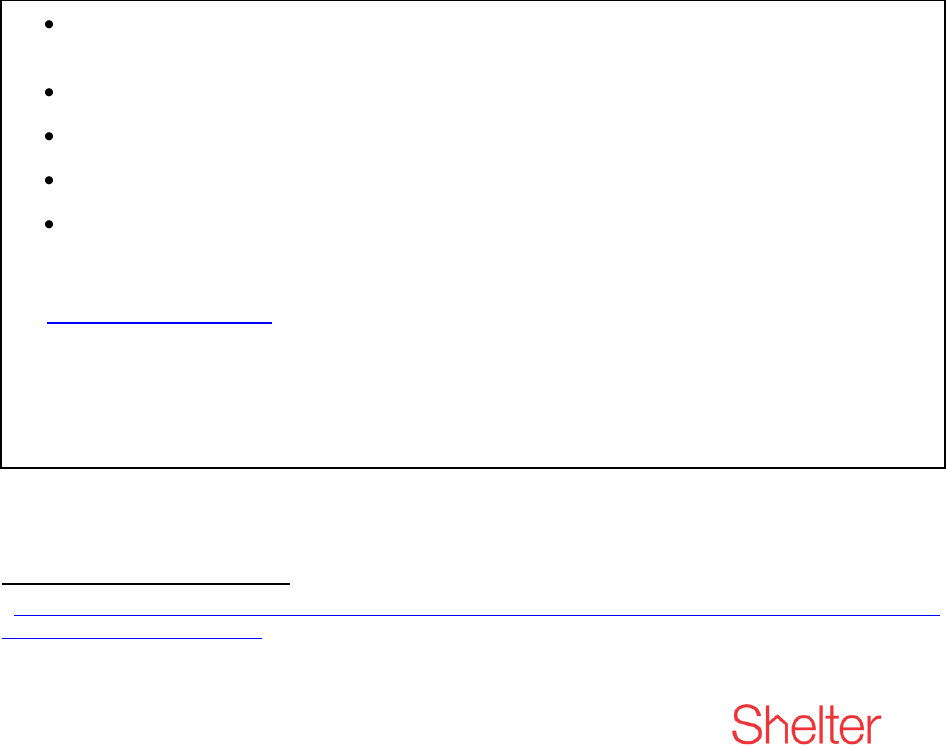
The affordability of private renting – small families claiming local housing allowance
DOWNLOADED FROM THE SHELTER WEBSITE www.shelter.org.uk
© 2012 Shelter
4
Background
Who claims Local Housing Allowance and how does it differ from other types of Housing
Benefit?
Local Housing Allowance (LHA) is claimed by private renters that are eligible for assistance with
meeting their rental payments
9
. The system has been in place since 2008 and differs from
housing benefit paid to tenants in the social rented sector, and private renters on regulated (pre-
1988) tenancies, in that a set amount is paid, according to household make-up and area,
regardless of the actual rent. Close to half of LHA claimants (48%) had to pay a shortfall to meet
their rental payments even prior to the changes
10
.
LHA uses a nationally set system for setting the maximum eligible rent on which benefit awards
are calculated. Rates are now based on the 30
th
percentile (previously the 50th) of advertised
rents in the Broad Rental Market Area that a claimant lives in. There are currently just over a
million and a quarter LHA claimants in Great Britain, and this now constitutes the vast majority
(83%) of Housing Benefit claims in the private rented sector. Separate rates are set for each
property size and claimants are allocated to a LHA rate based on their household size, at a
maximum of four (previously five) bedrooms. It is both an in-work and out-of work, means tested
benefit, which means many workers on low incomes (31% of current claimants) rely on it to stay
in their homes. The benefit is claimed by a household, rather than by each individual, so a family
or couple receiving LHA counts as one claim in Government statistics.
The table below features some key statistics on LHA claimants, from The Department of Work
and Pensions. The figures relate to Great Britain as England only figures not published to this
level of detail, and they are the latest available:
9
http://england.shelter.org.uk/get_advice/paying_for_a_home/housing_benefit_and_local_housing_allowa
nce/local_housing_allowance
10
Hansard (05 March 2010) cc1422W-1423W
There are 1.302 million households claiming LHA in Great Britain (as at February
2012) [1]
The average LHA award is £109 a week (as at February 2012) [1]
31% of LHA claimants are in work (as at January 2012) [1] & [2]
22% are unemployed and claiming Job Seekers Allowance (as at March 2010) [3]
48% of households claiming LHA have dependents (as at March 2010) [3]
Sources:
[1] DWP monthly statistics on Housing Benefit and Council Tax Benefit,
[2] Parliamentary question reference 12/04/204-SGS,
[3] Impacts of Housing Benefit proposals: Changes to the Local Housing Allowance to be
introduced in 2011-12, DWP, July 2010

The affordability of private renting – small families claiming local housing allowance
DOWNLOADED FROM THE SHELTER WEBSITE www.shelter.org.uk
© 2012 Shelter
5
Summary of the changes to local housing allowance in the private rented sector
The emergency budget in June 2010 and Comprehensive Spending Review in October 2010
announced a number of changes to the LHA system, and these are summarised in the table
below. The effective dates are for new claimants only with existing claimants receiving nine
months transitional protection for the first three changes. This means that existing claimants will
switch onto the new rates during 2012, depending on the anniversary of their claim.
What is changing?
Effective
from
Current claimants affected
Using the 30
th
percentile of the range of local (Broad
Rental Market Area) rents as the maximum payable
instead of the median
April 2011
Claimants whose rent is above the 30
th
percentile of rents for that size in their area
Ending of the 5-bedroom rate, LHA restricted to 4
bed rate
April 2011
All households eligible for the 5 bedroom
rate
Introducing absolute caps on the maximum rates
that can be paid for each size of property
April 2011
Claimants in very high-cost areas, especially
inner London
Stopping claimants being entitled to keep up to a
£15 'excess' above their actual rent if that rent was
below the LHA rate
April 2011
Claimants whose rent is below the current
median rent for their property size
Increasing deductions for non-dependants living with
HB claimants
April 2011
Households with other related adults in
them, such as grown-up children, elderly
parents or siblings
Increasing the age range for the restriction of single
people‟s LHA to the Shared Accommodation Rate
from under 25s to under 35s
January 2012
Single, childless people aged 25 – 34 and
living in self-contained accommodation
Linking increases in LHA over time to the Consumer
Prices Index (CPI) rather than actual rents
April 2013
Claimants living in areas where local rents
are increasing at a greater pace than CPI.
Rates are being frozen from April 2012.
A cap on the total amount of benefits payable to any
out of work household, likely to be set at £500 per
week
April 2013
Out of work claimants whose income from
LHA and other benefits is in excess of £500
per week
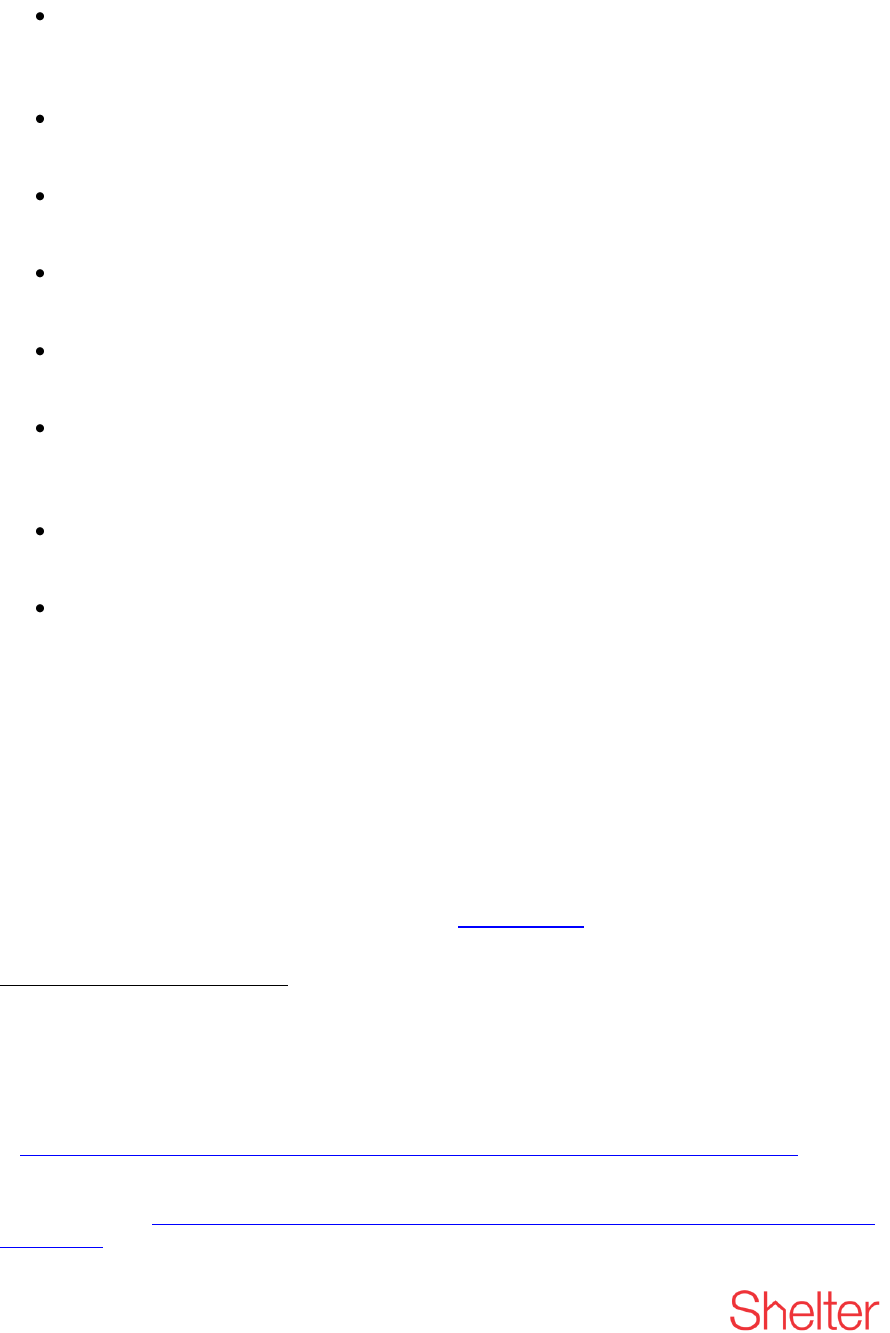
The affordability of private renting – small families claiming local housing allowance
DOWNLOADED FROM THE SHELTER WEBSITE www.shelter.org.uk
© 2012 Shelter
6
Key Findings
Affordability for small families:
Maximum Local Housing Allowance (LHA) was not enough to cover the cheapest quarter
of two bedroom rents in just over a third (34 per cent, 109) of local authorities in England,
indicating these areas were largely unaffordable for small families
11
claiming LHA.
In 34 of these 109 local authorities, the shortfall between the bottom quartile rent for a
two-bedroom home and the equivalent maximum LHA rate was £50 a month or more.
Local authorities which were largely unaffordable for small families needing to claim LHA
were spread across England, with many rural and northern areas affected.
The biggest three shortfalls between maximum LHA and the bottom quartile rent were
found in central London, where the caps on LHA are in operation.
Cambridge was the local authority outside central London with the largest shortfall
between maximum LHA and the bottom quartile rent at £200 per month.
In all regions in England, 23 per cent or more local authorities were largely unaffordable.
London was the region with the highest proportion of local authorities which were largely
unaffordable with 17 of the 32 London boroughs analysed falling into this category.
Outside of London, the East of England was the region with the most local authorities that
were largely unaffordable (8 out of 20).
A further 28 per cent of local authorities in England (90) were on the borderline of
affordability for a small family claiming LHA - in these areas the maximum LHA payable
for a two bedroom home was equal to the bottom quartile rent for two bedroom homes.
Method
Bottom quartile rents
12
were compared with maximum Local Housing Allowance (LHA) rates
13
, in
local authorities in England, as at April 2011, when the changes to LHA were first introduced. The
cheapest quarter of rents were selected as this threshold has been used in previous research on
this topic
14
and Government has consistently stated that at least 30 per cent of local rents will be
affordable with the new rates. The results on affordability should be considered alongside
consistent survey evidence showing that more than half of landlords are not willing to let to LHA
claimants
15
. Further details are available in the methodology section.
11
For the purpose of this report a small family is defined as a household with one or two children
(depending on their ages and genders) who are entitled to the two bedroom rate of LHA.
12
This is the 25
th
percentile rent, from VOA private rental market statistics October 2010 to September
2011 (with the mid-point of this range being April 2011). Local authorities with a sample size of below 100
for two bedroom rents are excluded.
13
As at April 2011
14
Housing benefit reform and the spatial segregation of low-income households in London, Cambridge
University, September 2010
15
53% of private landlords „not happy to let to HB/LHA claimants‟, English Housing Survey, Private
Landlords survey: http://www.communities.gov.uk/publications/corporate/statistics/ privatelandlords
survey2010

The affordability of private renting – small families claiming local housing allowance
DOWNLOADED FROM THE SHELTER WEBSITE www.shelter.org.uk
© 2012 Shelter
7
Advice needs:
Areas that are largely unaffordable in the analysis above, and have relatively high proportions of
private renters claiming housing benefit are likely to experience higher levels of need for advice
following the changes to LHA:
Local authorities that were largely unaffordable for small families claiming LHA, and
included relatively high proportions of private renters claiming housing benefit were mainly
found in urban and seaside areas, such as Brent, Brighton, Liverpool, Barnet, North
Devon and Plymouth.
The numbers and proportions of households claiming LHA vary considerably by local
authority. In the areas with the highest proportions of claimants, over half of the private
rental market is made up of LHA claimants, but, given the smaller size of the rental market
compared to other tenures, this still typically only accounts for around 5% of all
households in the local area. These statistics are shown in the annex tables.
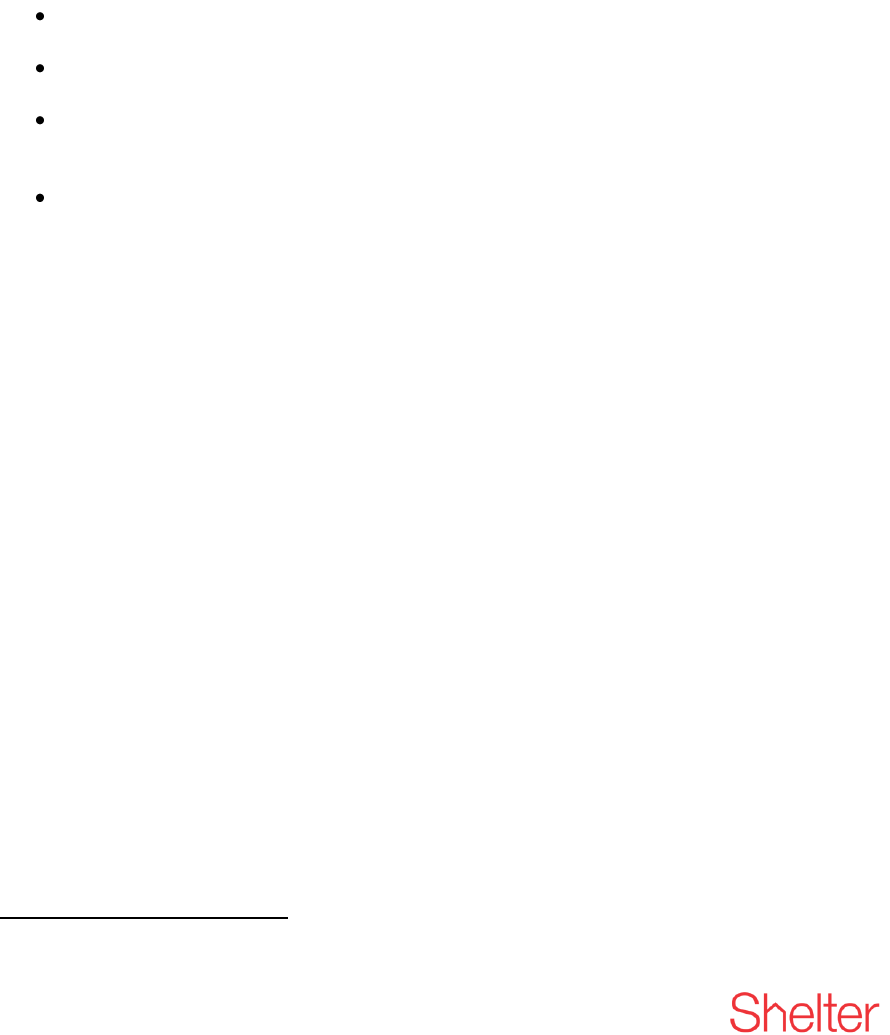
The affordability of private renting – small families claiming local housing allowance
DOWNLOADED FROM THE SHELTER WEBSITE www.shelter.org.uk
© 2012 Shelter
8
Methods and sources
Data sources
The analysis in this report is based on the Valuations Office Agency‟s (VOA) private rental market
statistics (October 2010 to September 2011) and the maximum LHA (LHA) rates (as at April
2011), which are also published by the VOA. All figures are for two bedroom homes, which is the
LHA rate a family with one or two children would qualify for. These dates are used to ensure
comparability between the rent figures (which have a mid-point of April 2011) and the LHA rates,
and because April 2011 was first month that the new way of calculating LHA rates was
introduced, for new claimants. The analysis in this research should therefore be viewed as
representing the experiences of new claimants around April 2011, when the changes were
introduced.
The VOA statistics are considered by many to be the best available source on private rents
because:
The sample size is very large – with more than half a million rents collected per year,
making it one of the largest available
16
.
They are based on the agreed contractual rent and not advertised rents, in contrast to
most website sources.
They provide a good representation of the lower end of the market, and include many lets
made directly by landlords and not via a letting agent. The rental averages it produces
tend to be lower and more realistic than other sources.
They are published in accordance with Office of National Statistics guidelines.
The VOA statistics, however, are not a perfect representation of the whole private rental market,
and tenancies where Housing Benefit was claimed from the outset are meant to be excluded. The
only definitive source for lets to LHA claimants is the DWPs Single Housing Benefit Extract, which
is not publicly available.
The four areas with less than 100 rents in their sample were excluded from the analysis, and the
average sample size of rents for the local authorities included was 615. The rental statistics
include monies paid to private landlords for utilities, whereas these are stripped out when LHA
rates are calculated. For the two bedroom homes in this analysis this difference is estimated to
be very small.
Following the changes to LHA, the maximum rates are set at the 30
th
percentile rent, and are
subject to caps. LHA rates are set using a distinct set of geographic boundaries (Broad Rental
Market Areas, or BRMAs), which are larger than local authority areas and often include parts of
two, three or occasionally more local authorities. These differing boundaries lie behind the
variations in affordability by local authority revealed in this research, and this is the reason why in
some local authority areas less than a quarter of homes are let at levels covered by maximum
LHA, whereas others are more affordable.
16
In contrast, the English Housing Survey samples only around 2,500 private rents per year.

The affordability of private renting – small families claiming local housing allowance
DOWNLOADED FROM THE SHELTER WEBSITE www.shelter.org.uk
© 2012 Shelter
9
Linking local authorities to the Broad Rental Market Areas (BRMA) used to set LHA rates
To carry out any analysis on affordability for LHA claimants using local authority level rental
figures, each local authority must be assigned to a main BRMA to ascertain an equivalent LHA
rate for that local authority area. In 2010 Chartered Institute of Housing carried out work which
linked each local authority to a „main‟ BRMA. This analysis was used in Shelter and CIH‟s joint
publication on the impact of the Welfare Reform Bill in January 2010
17
, and is also used in this
report. In the CIH work, it was found that the vast majority of local authorities have at least two
thirds of their area lying within one BRMA, and these local authorities are assigned to that „main‟
BRMA. In around 12 local authorities, it is less clear-cut as to which is the main BRMA with a
close split between two or more. In these cases, the analysis uses the BRMA with the highest
rate of LHA. This is a conservative assumption, and can have the effect of making a local
authority appear affordable when in fact up to 60% of its area may not be. This particularly affects
London, and some additional commentary is provided in the report in the few cases where this
boundary effect is likely to have had a strong impact on results.
Landlords not letting to benefit claimants
The results on affordability should be considered alongside survey evidence that less than half of
private landlords will let to benefit claimants
18
. Previous research by Shelter
19
has shown this to
be just as big an issue at the cheaper end of the market as for the market overall. This means
that even in an area where, for example, 30% of rents are affordable, in reality it is likely that only
around 15% will be affordable and accessible to LHA claimants. What is more, with an estimated
30-35%
20
of the national private rental market made up of households claiming LHA, it is clear
there is intense pressure on the lower end of the private rental market in many local areas.
Affordability of the bottom quarter of rents for small families claiming LHA
It is important to note that the affordability analysis in this report is a model, and as such makes
the assumptions that the household is entitled to claim the maximum LHA rate for their area
(which they may not be, for example if they are in employment) and is seeking a home at the 25
th
percentile rent. It does not show the actual rents being paid by LHA claimants, or where any
actual shortfalls are being paid (these figures are not published on a regular basis, or at a local
level). In reality the rents paid by LHA claimants and their circumstances and ability to cope with
shortfalls differ, but this research gives a good indication of the local authority areas which are
likely to be the hardest for claimants to afford to move to, or stay in.
The bottom quartile rent is used, ostensibly because the VOA statistics only show the 25
th
, 50
th
and 75
th
percentile rents for each property size, at local authority level, and we are therefore
restricted to these. However, it is a very suitable cut-off point for a number of other reasons.
Firstly, while the Government has stated that 30% of local rents will still be affordable in most
areas following the changes to LHA
21
, this analysis shows there are many (34% for two bedroom
17
http://england.shelter.org.uk/__data/assets/pdf_file/0007/334726/Impact_of_Welfare_Reform_Bill_measu
res_on_affordability_for_low_income_private_renting_families.pdf
18
53% of private landlords „not happy to let to HB/LHA claimants‟, English Housing Survey, Private
Landlords survey: http://www.communities.gov.uk/publications/corporate/statistics/ privatelandlords
survey2010
19
http://england.shelter.org.uk/professional_resources/policy_and_practice/policy_library/policy_
library_folder/the_path_to_success_-_shelresearch_on_housing_benefit_reform_the_final_report
20
Estimated for Shelter by CCHPR, October 2010, unpublished
21
DWP, Explanatory Memo for the Social Security Advisory Committee, 2010
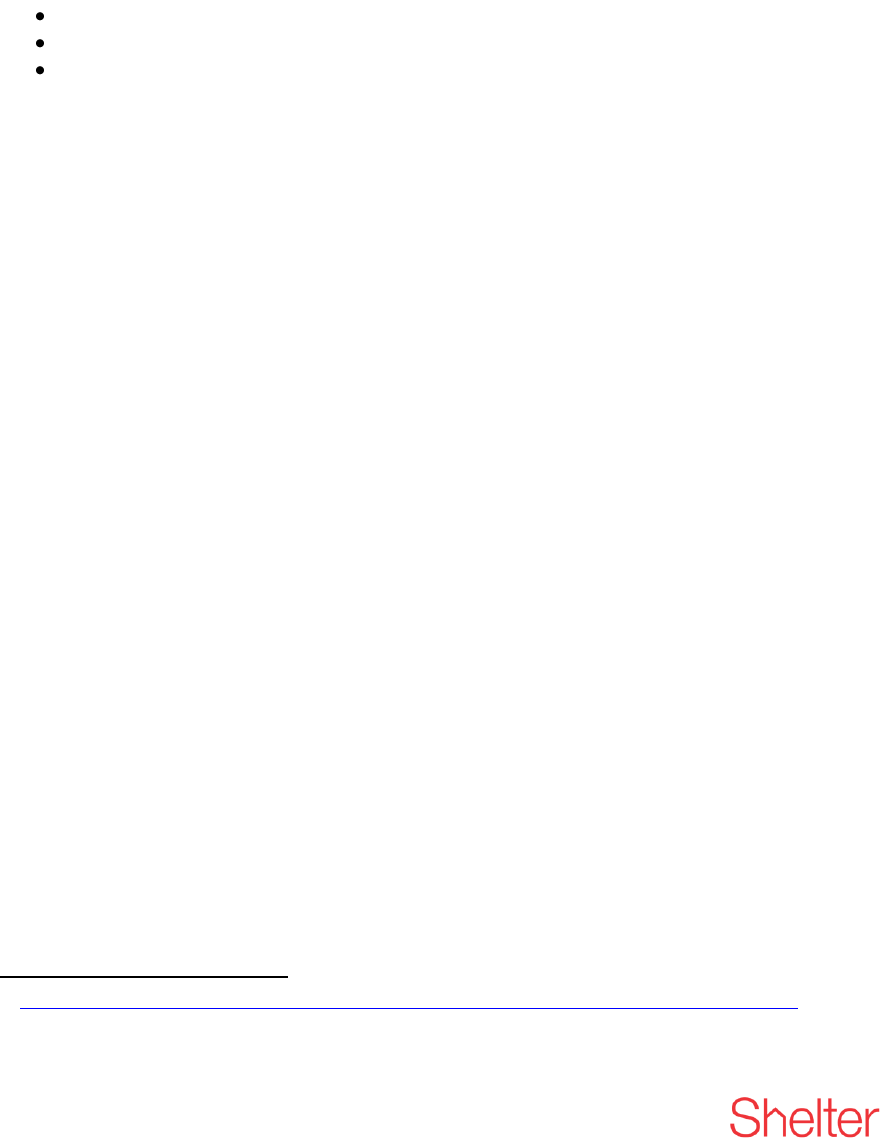
The affordability of private renting – small families claiming local housing allowance
DOWNLOADED FROM THE SHELTER WEBSITE www.shelter.org.uk
© 2012 Shelter
10
homes) local authority areas where less than a quarter of rents are affordable. Secondly the
bottom 25% of rents was the cut-off point used by Cambridge University to identify areas they
described as „largely unaffordable‟ in their 2010 work modelling the likely impact of the changes
to LHA on affordability for claimants in London, to 2016
22
.
It is important to note that LHA claimants will still be able to find homes to rent in these areas.
However, finding a home is likely to be more difficult, especially when the previously mentioned
landlord behaviours are factored in, and there is a higher likelihood they will need to pay a
shortfall between their LHA and rent from limited resources.
In the analysis of two bedroom homes for small families claiming LHA, local authorities are split
into three groups according to how the maximum LHA compares to the bottom quartile rent:
Maximum LHA is less than the 25
th
percentile rent = largely unaffordable
Maximum LHA is equal to the 25
th
percentile rent = borderline unaffordable
Maximum LHA is greater than the 25
th
percentile rent = largely affordable
The assumption that an area where maximum LHA is greater than the 25
th
percentile rent is
largely affordable is conservative. This is optimistic, because this group is likely to still include
some areas where the maximum rate of LHA does not cover the 30% of local rents the
Government has stated it should. However, the borderline category, where maximum LHA is
equal to the 25
th
percentile rent, may include some areas where 30% or even more of local rents
are affordable at maximum LHA. This is due to the clustering of rents around certain round
amounts, and will particularly affect areas where the sample sizes of rents are relatively small.
Additionally, only figures for the 25
th
, 50
th
and 75
th
percentiles are published, meaning that the
categorisation above is the best possible way of grouping the affordability of local areas for LHA
claimants.
In the analysis of two bedroom homes, four local authorities, where the sample of rents is less
than 100, are excluded. These are the City of London, Isles of Scilly, Oadby and Wigston, and
Rutland.
A limitation of the research is that housing markets often differ quite markedly within local
authorities, and at present the VOA figures are only published to this level. In reality there are
likely to be significant variations in affordability within some local authorities, and if data is
published to a lower level, this will be examined in later reports.
Annex tables
These tables include all figures used in the affordability analysis, with those with a sample size of
less than 100 rents excluded. Additionally, figures on the number of privately renting housing
benefit claimants are shown in each local authority, alongside estimates of this number as a
proportion of all households, and all privately renting households.
22
Housing benefit reform and the spatial segregation of low-income households in London, Cambridge
University, September 2010
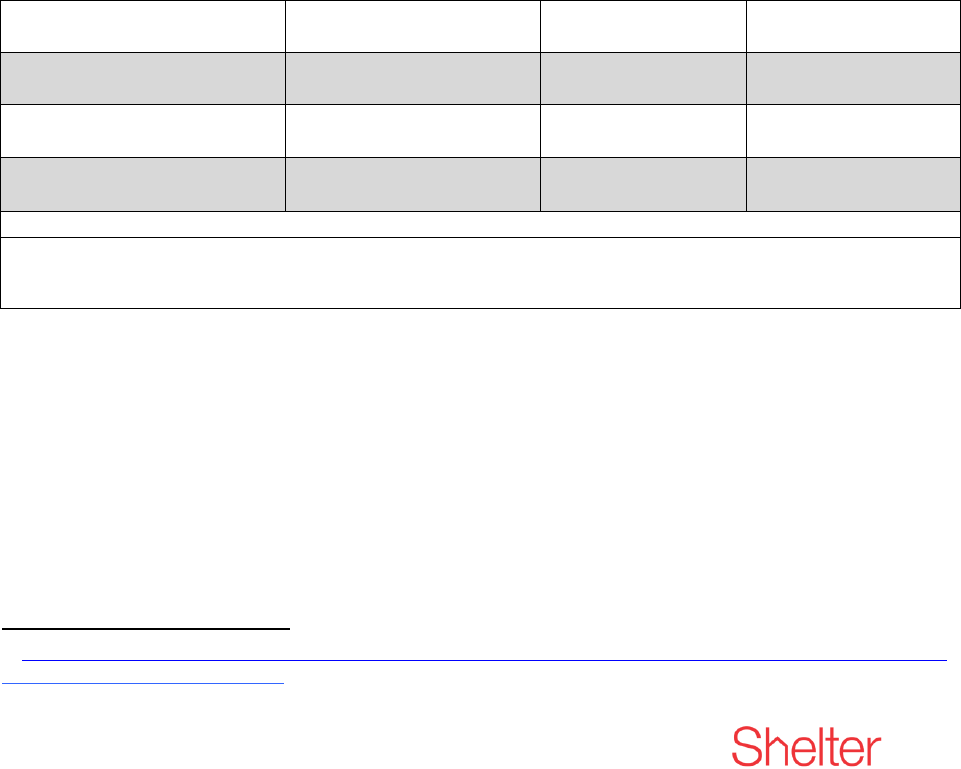
The affordability of private renting – small families claiming local housing allowance
DOWNLOADED FROM THE SHELTER WEBSITE www.shelter.org.uk
© 2012 Shelter
11
Main Findings
Affordability for small families claiming Local Housing
Allowance
Families with one or two children (depending on their ages and genders
23
) will usually be entitled
to the two bedroom rate of Local Housing Allowance (LHA). The analysis in this section is as at
April 2011 and compares the bottom quartile private rent for two bedroom homes with the
equivalent maximum amount of LHA payable, in each local authority. This shows whether or not
the bottom quarter of private rents in the local authority were affordable with maximum LHA.
National overview
The table below shows that maximum LHA was not enough to cover the cheapest quarter of two
bedroom rents in just over a third (34%, 109) of local authorities in England, indicating these
areas were largely unaffordable for small families claiming LHA.
A further 28% of local authorities in England (90) were on the borderline of affordability for a small
family claiming LHA - in these areas the maximum LHA payable for a two bedroom home was
equal to the bottom quartile rent for two bedroom homes.
Figure 1: Local authorities in England, grouped by affordability of 25
th
percentile rent compared to
maximum Local Housing Allowance, 2 bedroom homes
Affordability definition
Affordability group
Number of local
authorities
% local authorities
Maximum LHA is less than
25
th
percentile rent
Largely unaffordable
109
34%
Maximum LHA is equal to
the 25
th
percentile rent
Borderline unaffordable
90
28%
Maximum LHA is more than
25
th
percentile rent
Largely affordable
123
38%
Sources: VOA Private Rental Market Statistics, 12 months from October 2010 to September 2011.
Average sample size = 615 2 bed rents, sample sizes below 100 not reported; combined with LHA rates
April 2011 https://lha-direct.voa.gov.uk/search.aspx
The map overleaf, shows local authorities in England colour coded according to the affordability
groups above. It highlights that there are largely unaffordable areas spread across England.
23
http://england.shelter.org.uk/get_advice/paying_for_a_home/housing_benefit_and_local_housing_allowa
nce/local_housing_allowance#1
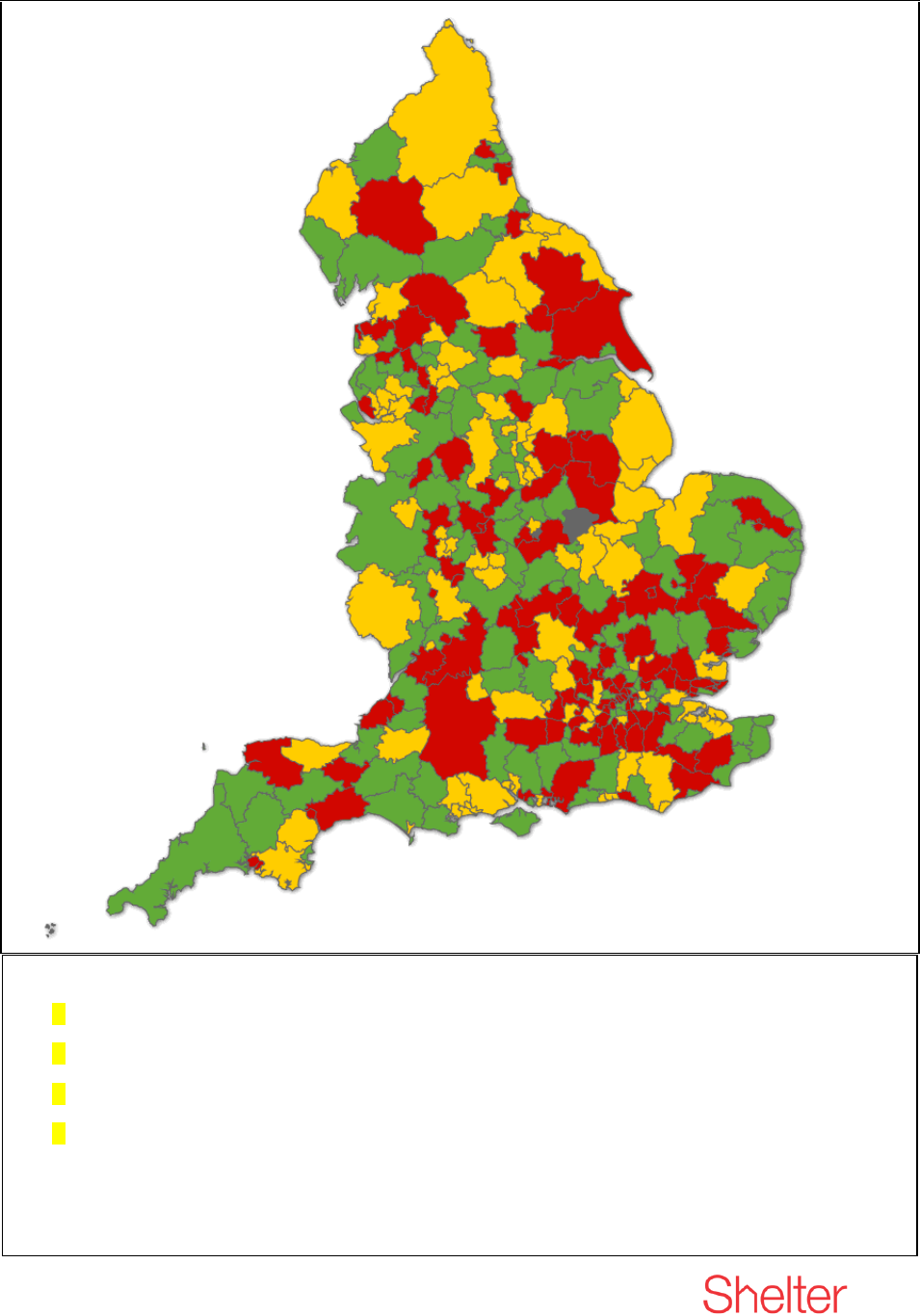
The affordability of private renting – small families claiming local housing allowance
DOWNLOADED FROM THE SHELTER WEBSITE www.shelter.org.uk
© 2012 Shelter
12
Figure 2: Map of local authorities in England, grouped by affordability of 25
th
percentile rent
compared to maximum Local Housing Allowance, 2 bedroom homes
Key:
█ Largely unaffordable – Maximum LHA is less than 25
th
% rent
█ Borderline - Maximum LHA is equal to 25
th
% rent
█ Largely affordable - Maximum LHA is more than 25
th
% rent
█ N/A sample size below 100 rents
Sources: VOA Private Rental Market Statistics, 12 months from October 2010 to September 2011.
Average sample size = 615 2 bed rents, sample sizes below 100 not reported; combined with LHA
rates April 2011 https://lha-direct.voa.gov.uk/search.aspx
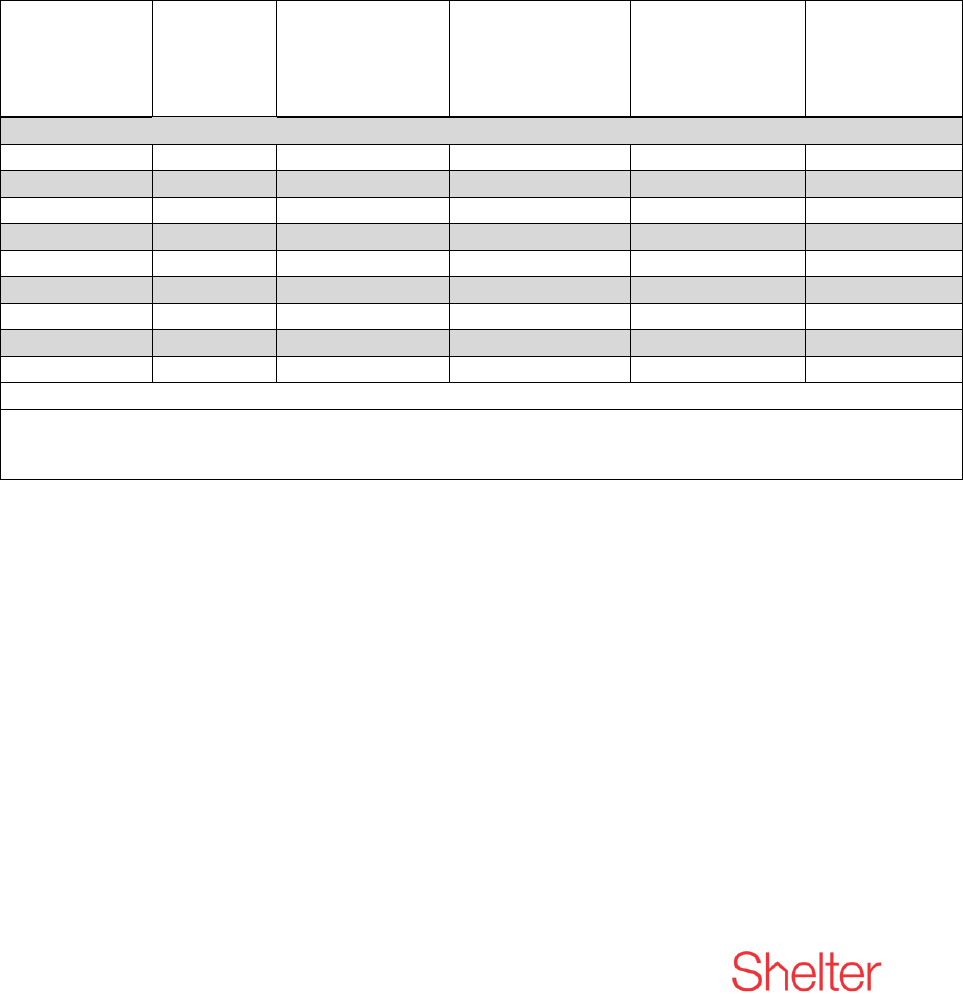
The affordability of private renting – small families claiming local housing allowance
DOWNLOADED FROM THE SHELTER WEBSITE www.shelter.org.uk
© 2012 Shelter
13
Regional overview
The table below shows the breakdown of largely unaffordable and borderline unaffordable local
authorities within each region. London and the East of England were the regions with the highest
proportions of local authorities that were largely unaffordable for small families claiming LHA.
Even in the East of England, the most affordable region, nearly a quarter (23 per cent) of local
authorities proved to be largely unaffordable. London was the region with the highest proportion
of local authorities which were largely unaffordable with 17 of the 32 London boroughs (57%)
analysed falling into this category.
Outside of London, the East of England was the region with the most local authorities that were
largely unaffordable (8 out of 20).
Figure 3: Regional breakdown, local authorities grouped by affordability of bottom quarter of rents
compared to maximum Local Housing Allowance, 2 bedroom homes
Region
Total
number of
local
authorities
analysed
Largely
unaffordable:
Number of local
authorities
Largely
unaffordable:
% of local
authorities
Borderline
unaffordable:
Number of local
authorities
Borderline
unaffordable:
% of local
authorities
North East
12
3
25%
4
33%
North West
39
9
23%
12
31%
Yorks & Hum
21
6
29%
7
33%
East Midlands
38
9
24%
15
39%
West Mids
30
9
30%
9
30%
East of Eng.
47
20
43%
8
17%
London
32
17
53%
4
13%
South East
67
25
37%
20
30%
South West
36
11
31%
11
31%
Sources: VOA Private Rental Market Statistics, 12 months from October 2010 to September 2011.
Average sample size = 615 2 bed rents, sample sizes below 100 not reported; compared with LHA rates
April 2011 https://lha-direct.voa.gov.uk/search.aspx

The affordability of private renting – small families claiming local housing allowance
DOWNLOADED FROM THE SHELTER WEBSITE www.shelter.org.uk
© 2012 Shelter
14
Local authority analysis
Figure 1 showed there were 109 local authorities in England where the maximum rate of LHA for
two bedroom homes was below the 25
th
percentile rent, meaning that LHA was not enough to
cover the cheapest quarter of two bedroom private rented homes in the local authority area.
Figure 4, below, shows the 34 local authorities in which this difference was £50 per month or
more. These are the areas it is likely to be most difficult for a small family needing to claim LHA to
find an acceptable private rented home. The central boroughs of London top this list, driven by
the effect of the cap on LHA in these areas and the largest shortfall was £910 per month in
Kensington and Chelsea.
However, local authorities in five other regions are represented among those with shortfalls of
£50 per month or more. In Cambridge, which was the fourth most unaffordable local authority in
England for small families claiming LHA claimants, those receiving maximum LHA rate for two
bedroom homes would need to find an extra £200 per month to rent a home at the 25
th
percentile.
Previous research has also highlighted Cambridge as an area where affordability for LHA
claimants is a particular problem
24
. The reason for this is the wide variation between very high
rents in the city and its suburbs, and much lower rents in the surrounding rural area, which are
combined together to set an LHA rate which effectively puts most of the city and its suburbs out
of reach for claimants. This is supported by the relatively small proportion of privately renting
households that are claiming housing benefit in the Cambridge local authority area – 8%,
compared to a national average of 35%
25
.
Local authorities where maximum LHA was not enough to cover the cheapest quarter of rents
were not confined to high-rent areas. 20 of the 109 largely unaffordable areas actually had 25
th
percentile rents that were at or below the national 25
th
percentile rent for England of £475 per
month. For example, in Ribble Valley, in the North West, the 25
th
percentile rent for a two
bedroom home was £475 a month, whereas maximum LHA was £390, leaving a shortfall of £85
per month.
Largely unaffordable areas were also not confined to urban areas, with 11 of the 34 local
authorities with shortfalls of £50 a month or more classified as rural.
24
Postcode lottery, Shelter, 2009
25
Estimated for Shelter by CCHPR, October 2010, unpublished
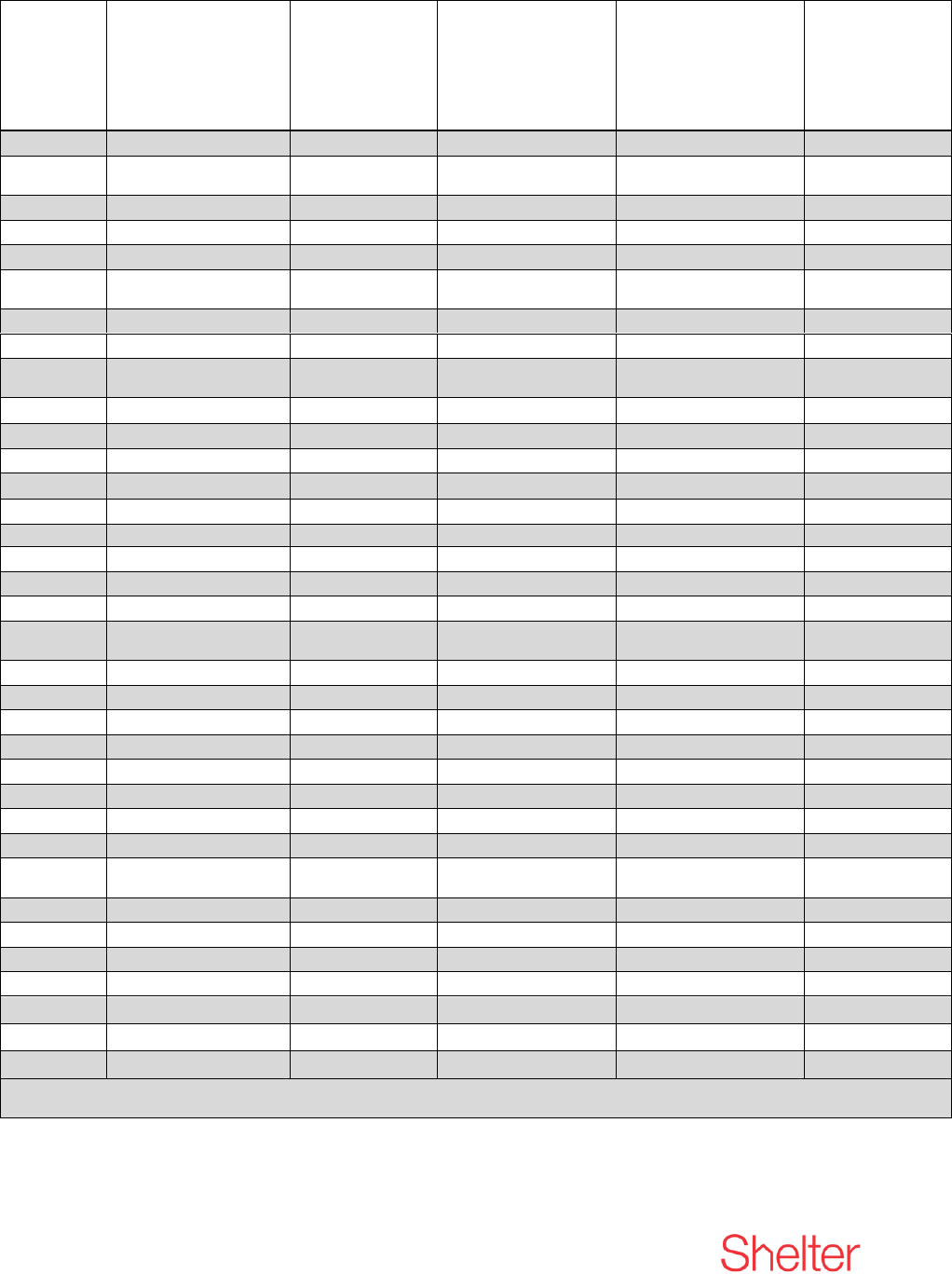
The affordability of private renting – small families claiming local housing allowance
DOWNLOADED FROM THE SHELTER WEBSITE www.shelter.org.uk
© 2012 Shelter
15
Figure 4: Local authorities in England, ranked by largest shortfall between maximum Local
Housing Allowance and 25
th
percentile rent, two bedroom homes, £50 per month or more
shortfall.
Rank (by
most
unaffor-
dable)
Local authority
Region
25th% rent per
month, two
bedroom homes,
October 2010 -
September 2011
[1]
Maximum Local
Housing
Allowance, two
bedroom homes,
April 2011 (per
month) [2]
Shortfall per
month (-)
1
Kensington &
Chelsea
London
£2,167
£1,257
£910
2
Westminster
London
£1,875
£1,257
£618
3
Camden
London
£1,582
£1,257
£325
4
Cambridge
East of England
£775
£575
£200
5
Hammersmith &
Fulham
London
£1,387
£1,213
£173
6
Islington
London
£1,408
£1,257
£152
7
Brent
London
£1,050
£900
£150
8
Windsor &
Maidenhead
South East
£900
£775
£125
9
Epping Forest
East of England
£795
£675
£120
10
Southwark
London
£1,100
£995
£105
11
Lambeth
London
£1,096
£995
£101
12
Richmond
London
£1,100
£1,000
£100
13
East Hertfordshire
East of England
£725
£625
£100
14
Epsom and Ewell
South East
£895
£800
£95
15
Mole Valley
South East
£840
£750
£90
16
Ribble Valley
North West
£475
£390
£85
17
Haringey
London
£1,049
£970
£79
18
South
Cambridgeshire
East of England
£650
£575
£75
19
Rochford
East of England
£675
£600
£75
20
Brentwood
East of England
£725
£650
£75
21
Oxford
South East
£850
£775
£75
22
Surrey Heath
South East
£795
£725
£70
23
Bromsgrove
West Midlands
£550
£485
£65
24
Hart
South East
£750
£695
£55
25
Three Rivers
East of England
£850
£795
£55
26
Rother
South East
£550
£500
£50
27
York
Yorkshire &
Humber
£575
£525
£50
28
Castle Point
East of England
£650
£600
£50
29
Stevenage
East of England
£675
£625
£50
30
Chiltern
South East
£775
£725
£50
31
Tandridge
South East
£800
£750
£50
32
Brighton and Hove
South East
£825
£775
£50
33
Croydon
London
£850
£800
£50
34
Bromley
London
£850
£800
£50
Sources: [1] VOA Private Rental Market Statistics, 12 months from October 2010 to September 2011. Average sample size =
615 2 bed rents, sample sizes below 100 not reported.[2] LHA rates April 2011 https://lha-direct.voa.gov.uk/search.aspx
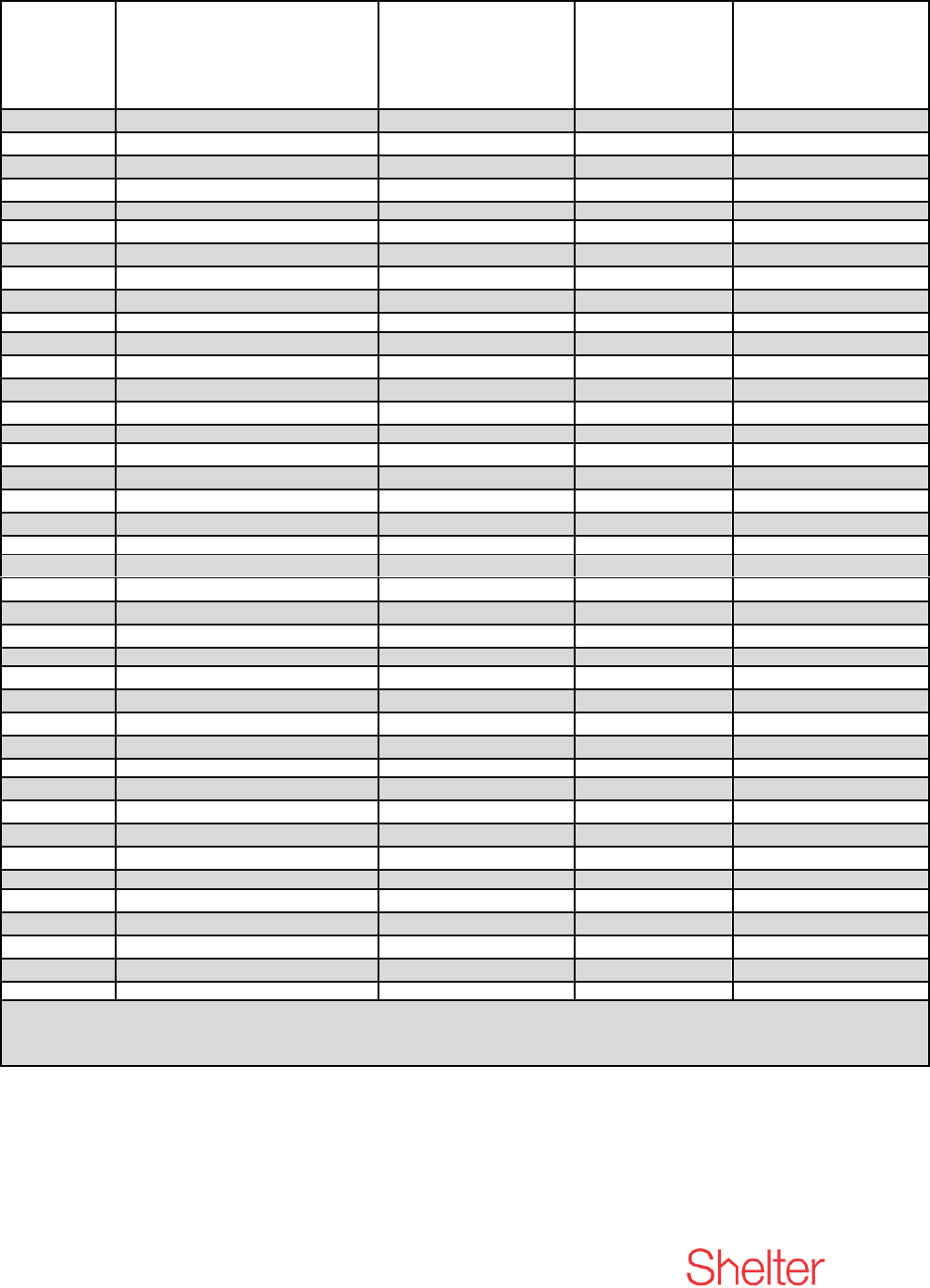
The affordability of private renting – small families claiming local housing allowance
DOWNLOADED FROM THE SHELTER WEBSITE www.shelter.org.uk
© 2012 Shelter
16
Figure 5: Local authorities with the largest shortfalls between maximum Local Housing Allowance
and 25
th
percentile rent, two bedroom homes, top three in each region (excluding London).
Rank
within
region
(national
rank)
Region / Local Authority
25th% rent per
month, two
bedroom homes,
October 2010 -
September 2011 [1]
Maximum
Local Housing
Allowance
April 2011 (per
month) [2]
Shortfall per month
(-)
North East
1 (69)
Stockton-on-Tees
£450
£425
£25
2 (81)
Sunderland
£450
£433
£17
3 (88)
Newcastle upon Tyne
£460
£450
£10
North West
1 (16)
Ribble Valley
£475
£390
£85
2 (37)
Trafford
£570
£525
£45
3 (45)
Eden
£450
£410
£40
Yorkshire & Humber
1 (27)
York
£575
£525
£50
2 (40)
East Riding of Yorkshire
£412
£368
£44
3 (48)
Craven
£460
£425
£35
East Midlands
1 (39)
Rushcliffe
£495
£450
£45
2 (44)
South Northamptonshire
£550
£510
£40
3 (68)
Lincoln
£450
£425
£25
West Midlands
1 (23)
Bromsgrove
£550
£485
£65
2 (47)
Newcastle-under-Lyme
£425
£390
£35
3 (58)
Worcester
£550
£525
£25
East of England
1 (4)
Cambridge
£775
£575
£200
2 (9)
Epping Forest
£795
£675
£120
3 (13)
East Hertfordshire
£725
£625
£100
South East
1 (8)
Windsor and Maidenhead
£900
£775
£125
2 (14)
Epsom and Ewell
£895
£800
£95
3 (15)
Mole Valley
£840
£750
£90
South West
1 (36)
Exeter
£628
£580
£48
2 (57)
Stroud
£525
£500
£25
3 (59)
East Devon
£550
£525
£25
Sources: [1] VOA Private Rental Market Statistics, 12 months from October 2010 to September 2011. Average
sample size = 615 2 bed rents, sample sizes below 100 not reported.[2] LHA rates April 2011 https://lha-
direct.voa.gov.uk/search.aspx
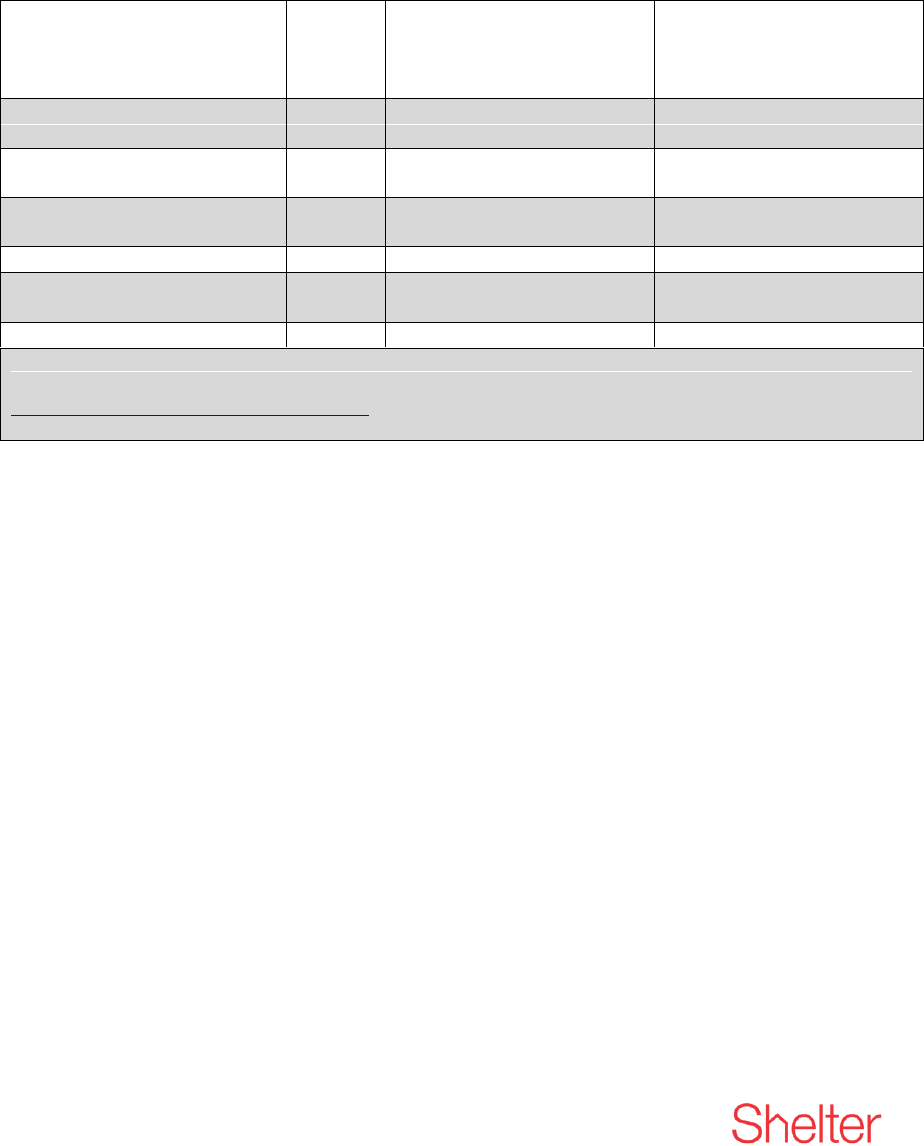
The affordability of private renting – small families claiming local housing allowance
DOWNLOADED FROM THE SHELTER WEBSITE www.shelter.org.uk
© 2012 Shelter
17
Affordability and urban rural classification
Figure 6, below, shows that 55% of local authorities which were largely unaffordable for small
families claiming LHA, were classified as urban areas, compared to a national average of 46%.
This is only a small difference and, as the previous tables show, many rural areas feature in the
largely unaffordable group.
Figure 6: Affordability of two bedroom homes for small families claiming LHA, by urban and rural
classification
Group
Total
% of local authorities
classified urban
% of local authorities
classified rural
Largely unaffordable
109
55%
45%
Borderline unaffordable
90
56%
44%
Largely affordable
123
46%
54%
All local authorities with data
322
52%
48%
Sources: VOA Private Rental Market Statistics, 12 months from October 2010 to September 2011.
Average sample size = 615 2 bed rents, sample sizes below 100 not reported; LHA rates April 2011
https://lha-direct.voa.gov.uk/search.aspx; Urban and rural classifications from DEFRA
http://www.defra.gov.uk/statistics/rural/what-is-rural/rural-urban-classification/
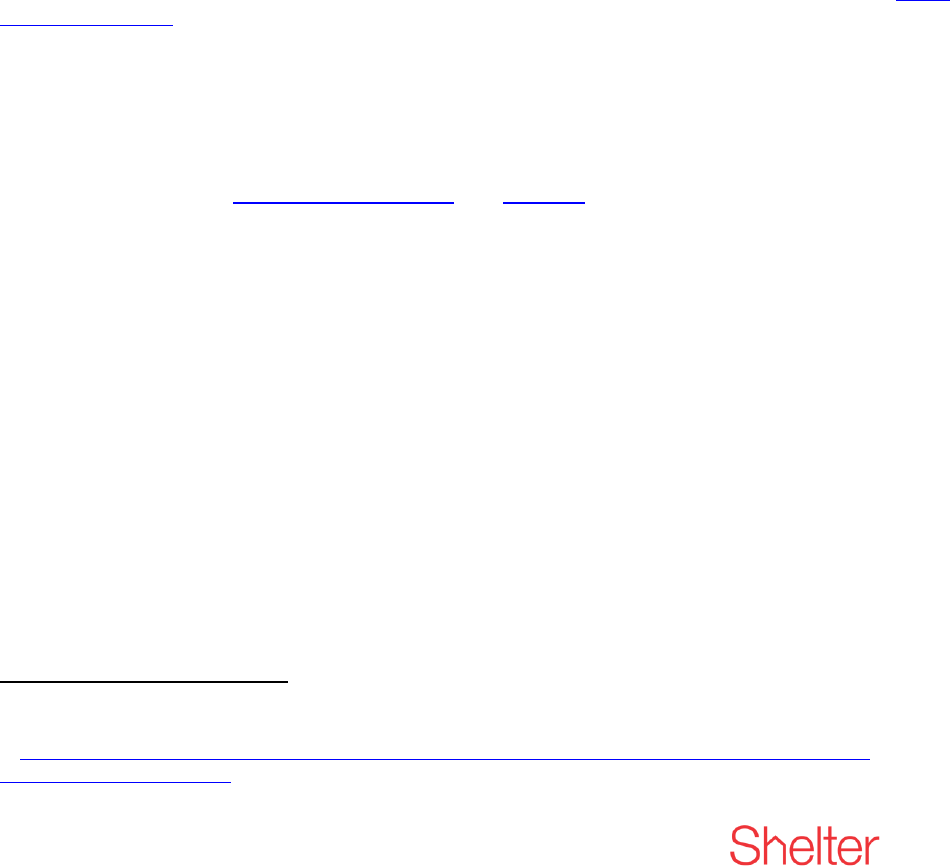
The affordability of private renting – small families claiming local housing allowance
DOWNLOADED FROM THE SHELTER WEBSITE www.shelter.org.uk
© 2012 Shelter
18
Advice needs: Largely unaffordable areas with high
proportions of privately renting claimants
Local authorities that have both high proportions of their population that are private renters
claiming housing benefit
26
, and a 25
th
percentile rent that is not covered by maximum LHA, are
likely to experience the greatest need for housing and financial advice, as a result of the changes
to LHA.
The table below, shows largely unaffordable areas, ranked by those with the highest proportions
of private renting claimants by population and therefore most likely to experience the greatest
need for housing and financial advice. These local authorities tend to be in major cities, such as
London, Manchester and Liverpool, or coastal towns such as Brighton, Plymouth and North
Devon.
These results are only a guide, and it must be remembered that many local authorities are
covered by more than one Broad Rental Market Area, meaning that different rates of LHA are
paid in different parts of the local authority area. Additionally, areas that are not categorised
largely unaffordable will nonetheless include many privately renting LHA claimants who will lose
as a result of the changes. Any highly targeted initiatives seeking to get advice to people affected
by the LHA changes would need to factor in more detailed criteria such as these.
Local Authorities are responsible for communicating the changes to their LHA customers. Good
practice guidance has been produced by DWP, but is not mandatory to follow. Customers should
receive notification that the amount of LHA they receive is going to change well in advance of
their anniversary date, but the exact amount may not be communicated until much nearer the
time. This means receiving good quality advice early can be crucial for claimants. The recently
published Summary of Early Findings, by DWP
27
, showed that when asked how much they knew
about the changes to LHA, 87% of claimants said „Not very much‟ or „nothing at all‟.
Detailed information for people needing advice and advisors on the changes to Housing Benefit is
available on the Shelter and NHAS websites.
26
Local level figures for LHA claimants only are not available, but the vast majority of private renters
claiming HB are now on the LHA system
27
Monitoring the impact of the changes to the Local Housing Allowance system of housing benefit:
Summary of early findings, DWP, June 2012
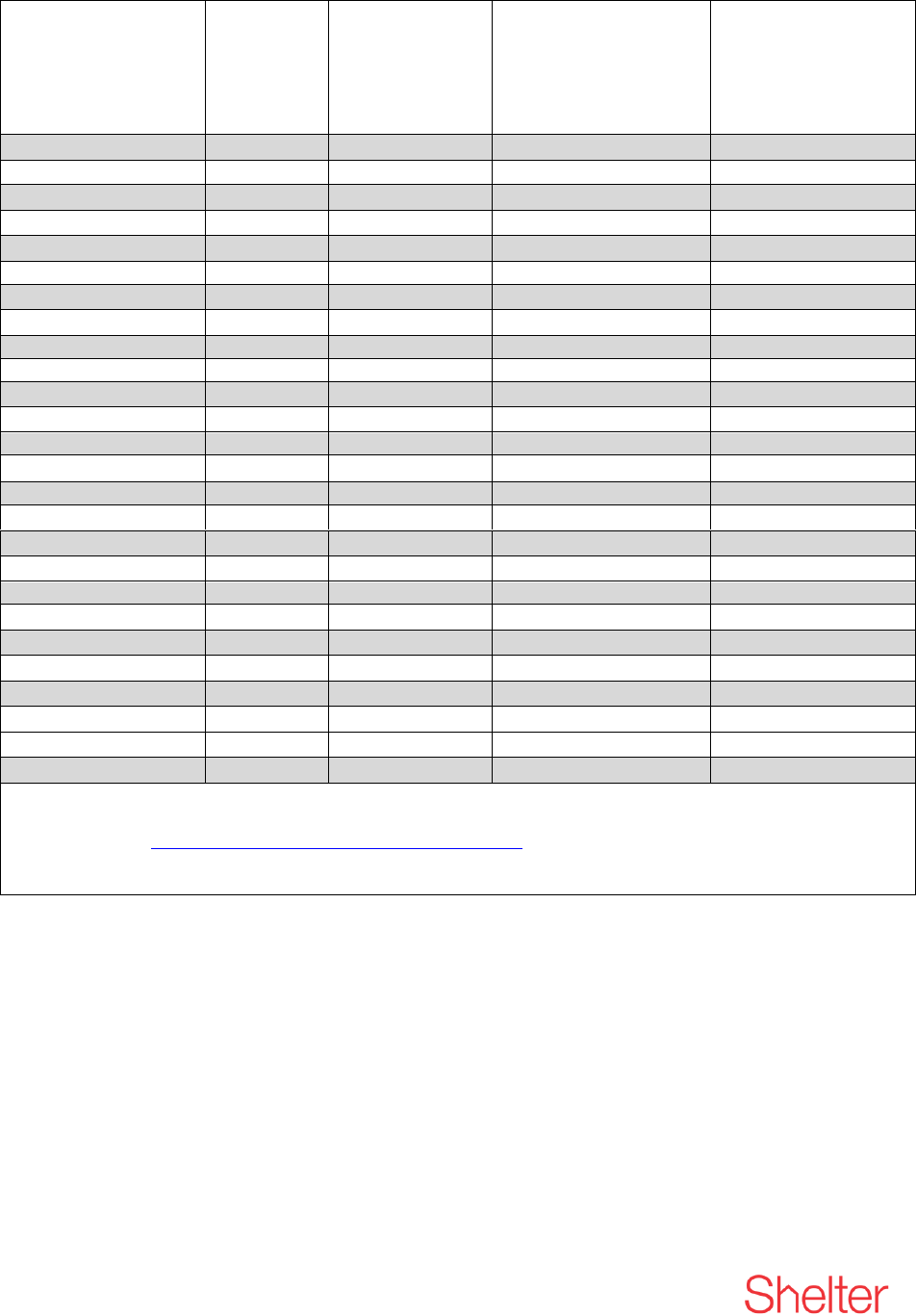
The affordability of private renting – small families claiming local housing allowance
DOWNLOADED FROM THE SHELTER WEBSITE www.shelter.org.uk
© 2012 Shelter
19
Figure 7: Local authorities that were largely unaffordable for small families claiming Local
Housing Allowance, top 25 ranked by proportion of all households who are private renting and
claiming housing benefit.
Local authority
Region
Shortfall
between
maximum LHA
and 25
th
percentile rent,
per month [1]
Households private
renting and claiming
housing benefit as a
proportion (%) of all
households [2]
Number of
Households private
renting and
claiming housing
benefit [3]
Brent
London
£150
6.5%
16,580
Haringey
London
£79
6.4%
14,350
Brighton and Hove
South East
£50
5.3%
13,740
Croydon
London
£50
4.9%
16,940
Liverpool
North West
£25
4.7%
20,950
Barnet
London
£48
4.2%
14,750
Harrow
London
£25
4.0%
9,190
North Devon
South West
£5
3.8%
3,480
Redbridge
London
£25
3.7%
10,010
Plymouth UA
South West
£10
3.7%
9,510
Wyre
North West
£3
3.6%
4,040
Westminster
London
£618
3.4%
8,660
Manchester
North West
£4
3.4%
16,800
North Somerset
South West
£10
3.3%
7,020
Blackburn with Dar.
North West
£5
3.3%
4,600
Lincoln
East Mids
£25
3.3%
2,940
Bristol
South West
£25
3.2%
14,060
Lambeth
London
£101
3.1%
8,860
Castle Point
East
£50
3.1%
2,730
Hounslow
London
£25
3.0%
7,220
Stockton-on-Tees
North East
£25
3.0%
5,760
Rother
South East
£50
3.0%
2,680
Milton Keynes
South East
£22
3.0%
7,150
Sunderland
North East
£17
2.8%
7,970
Hamm. and Fulham
London
£173
2.7%
4,580
Sources: [1] VOA Private Rental Market Statistics, 12 months from October 2010 to September 2011.
Average sample size = 615 2 bed rents, sample sizes below 100 not reported in combination with LHA
rates April 2011 https://lha-direct.voa.gov.uk/search.aspx. [2] DWP monthly benefit statistics,Table 3:
Housing Benefit recipients by Region and Local Authority and CLG population estimates, as at 2010.[3]
DWP monthly benefit statistics,Table 3: Housing Benefit recipients by Region and Local Authority
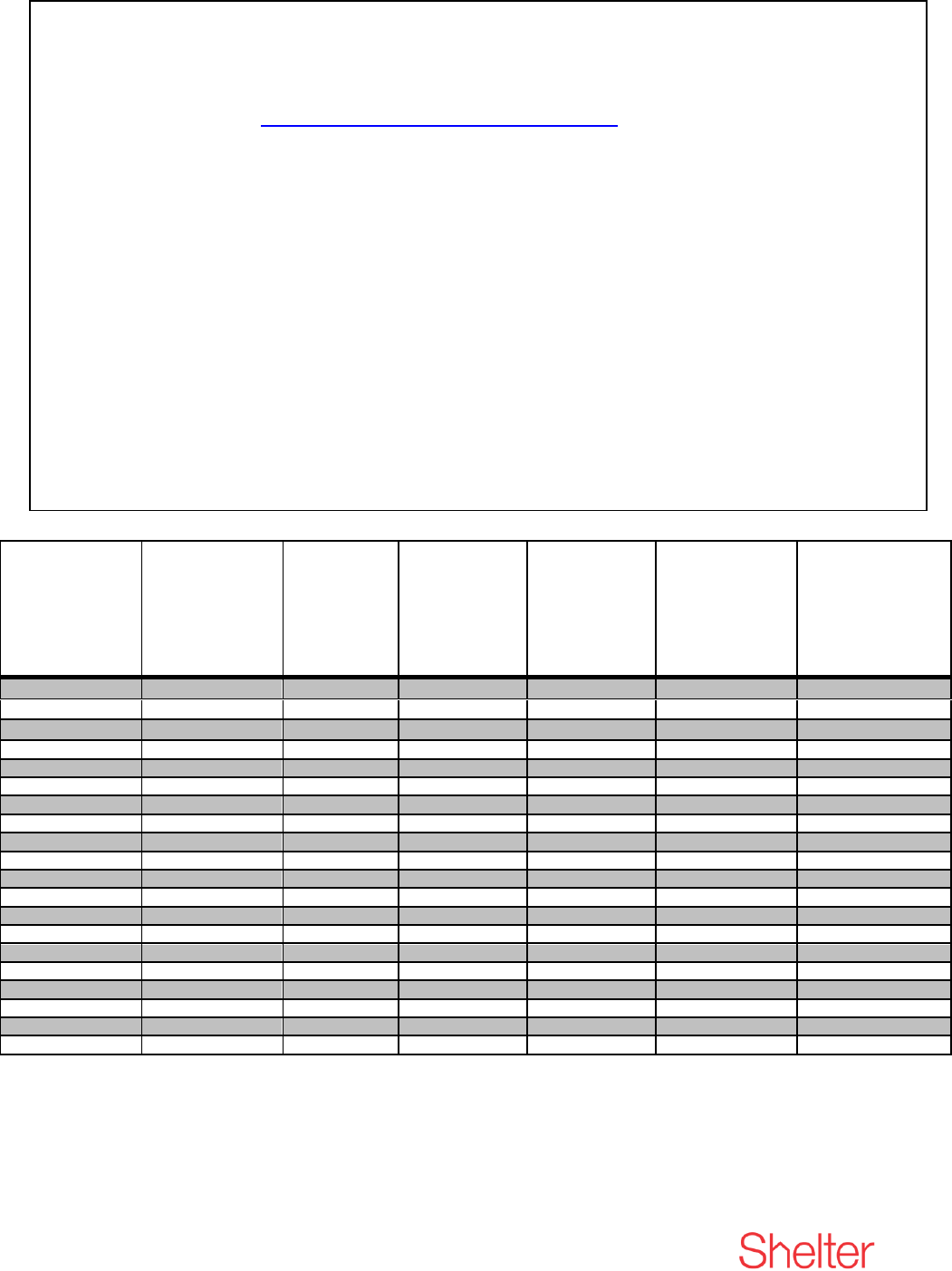
The affordability of private renting – small families claiming local housing allowance
DOWNLOADED FROM THE SHELTER WEBSITE www.shelter.org.uk
© 2012 Shelter
20
Annex tables
Region/ local
authority
25th% rent per
month, October
2010 - September
2011: 2 bedroom
homes [1]
Maximum rate
of LHA per
month: 2
bedroom
homes [2]
Shortfall
between
maximum LHA
rate and 25th%
rent: 2 bedroom
homes negative
figures mean a
shortfall [1&2]
Number of
private renting
housing benefit
claimants [3]
Private renting
housing benefit
claimants as a %
of all households
[4]
Private renting
Housing Benefit
claimants as a % of
all privately renting
households
(estimated) [5]
North East
County Durham
£380
£380
£0
14,300
2.8%
48%
Darlington
£385
£390
£5
4,170
4.1%
47%
Gateshead
£425
£450
£25
4,690
2.4%
39%
Hartlepool
£390
£425
£35
3,770
4.1%
56%
Middlesbrough
£425
£425
£0
5,890
4.1%
57%
Newcastle
£460
£450
-£10
6,430
2.2%
19%
North Tyneside
£425
£450
£25
4,760
2.4%
33%
Northumberland
£375
£375
£0
7,310
2.3%
28%
Redcar & C‟land
£425
£425
£0
4,260
3.1%
46%
South Tyneside
£400
£450
£50
3,650
2.4%
41%
Stockton-on-Tees
£450
£425
-£25
5,760
3.0%
53%
Sunderland
£450
£433
-£17
7,970
2.8%
50%
Key to sources for annex tables:
[1] VOA Private Rental Market Statistics, 12 months from October 2010 to September 2011.
[2] LHA rates April 2011 https://lha-direct.voa.gov.uk/search.aspx
[3] DWP monthly benefit statistics, Table 3: Housing Benefit recipients by Region and Local
Authority. As at September 2011. Note this is all private renting HB claims, LHA claims constitute
approx 83% of these.
[4] Calculated using [3] in combination with ONS/ CLG population estimates by local authority, as
at 2010.
[5] Estimated for Shelter by CCHPR, October 2010, unpublished. These figures are likely to
slightly overestimate the proportion due to differences in the recording of multi-person shared
households between the DWP and DCLG datasets.
The tables are sorted alphabetically, within regions.
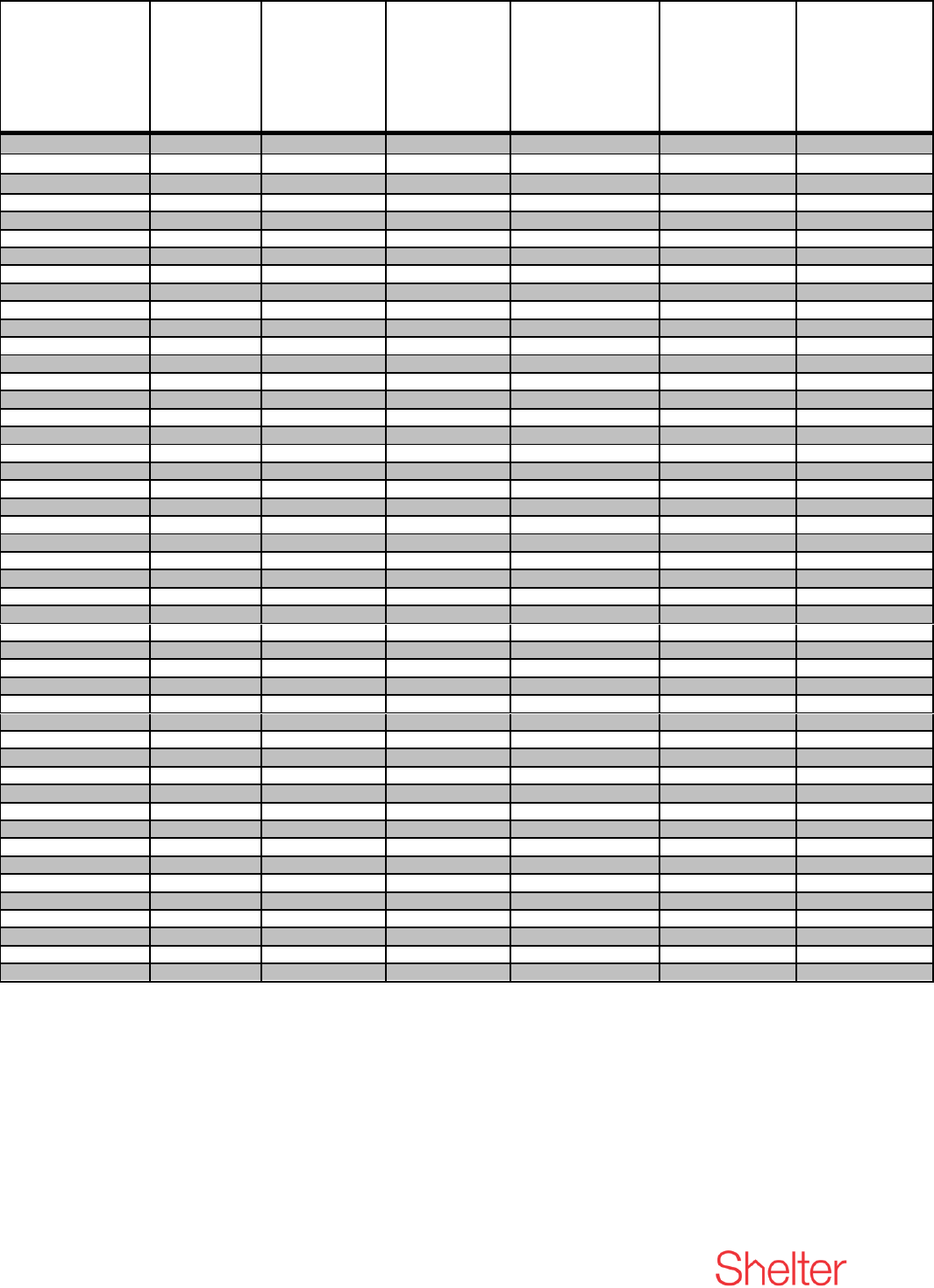
The affordability of private renting – small families claiming local housing allowance
DOWNLOADED FROM THE SHELTER WEBSITE www.shelter.org.uk
© 2012 Shelter
21
Region/ local
authority
25th% rent per
month,
October 2010
- September
2011: 2
bedroom
homes [1]
Maximum rate of
LHA per month:
2 bedroom
homes [2]
Difference
between
maximum LHA
rate and 25th%
rent: 2 bedroom
homes negative
figures mean a
shortfall [1&2]
Number of private
renting Housing
Benefit claimants [3]
Private renting
housing benefit
claimants as a %
of all households
[4]
Private renting
Housing Benefit
claimants as a %
of all privately
renting
households
(estimated) [5]
North West
Allerdale
£395
£395
£0
1,460
1.6%
40%
Barrow-in-Furness
£375
£380
£5
2,640
3.7%
45%
Blackburn w. Dar
£395
£390
-£5
4,600
3.3%
40%
Blackpool
£475
£495
£20
14,310
10.2%
58%
Bolton
£395
£419
£24
7,130
2.7%
48%
Burnley
£368
£368
£0
4,540
5.3%
54%
Bury
£450
£419
-£31
4,680
2.5%
39%
Carlisle
£400
£410
£10
2,030
1.9%
23%
Cheshire East
£495
£525
£30
6,170
1.7%
27%
C‟shre W & Chester
£500
£500
£0
6,570
2.0%
33%
Chorley
£450
£475
£25
1,810
1.7%
39%
Copeland
£380
£395
£15
1,070
1.5%
25%
Eden
£450
£410
-£40
720
1.4%
13%
Fylde
£495
£495
£0
2,770
3.6%
33%
Halton
£450
£450
£0
3,090
2.6%
61%
Hyndburn
£370
£390
£20
3,850
4.7%
60%
Knowsley
£450
£450
£0
4,560
3.1%
89%
Lancaster
£495
£495
£0
5,270
3.7%
29%
Liverpool
£475
£450
-£25
20,950
4.7%
44%
Manchester
£499
£495
-£4
16,800
3.4%
25%
Oldham
£425
£425
£0
6,140
2.8%
47%
Pendle
£368
£368
£0
3,780
4.2%
50%
Preston
£460
£475
£15
3,280
2.4%
28%
Ribble Valley
£475
£390
-£85
810
1.4%
18%
Rochdale
£425
£425
£0
6,430
3.1%
54%
Rossendale
£375
£390
£15
1,880
2.8%
38%
Salford
£450
£495
£45
7,400
3.2%
32%
Sefton
£485
£500
£15
9,470
3.5%
58%
South Lakeland
£500
£525
£25
1,660
1.6%
17%
South Ribble
£495
£475
-£20
1,550
1.4%
39%
St. Helens
£425
£425
£0
4,170
2.4%
73%
Stockport
£500
£525
£25
5,770
2.0%
31%
Tameside
£445
£450
£5
6,060
2.8%
43%
Trafford
£570
£525
-£45
3,820
1.8%
20%
Warrington
£450
£450
£0
3,570
1.8%
41%
West Lancashire
£495
£500
£5
2,220
2.0%
41%
Wigan
£400
£400
£0
7,410
2.4%
49%
Wirral
£425
£450
£25
13,970
4.5%
65%
Wyre
£498
£495
-£3
4,040
3.6%
47%
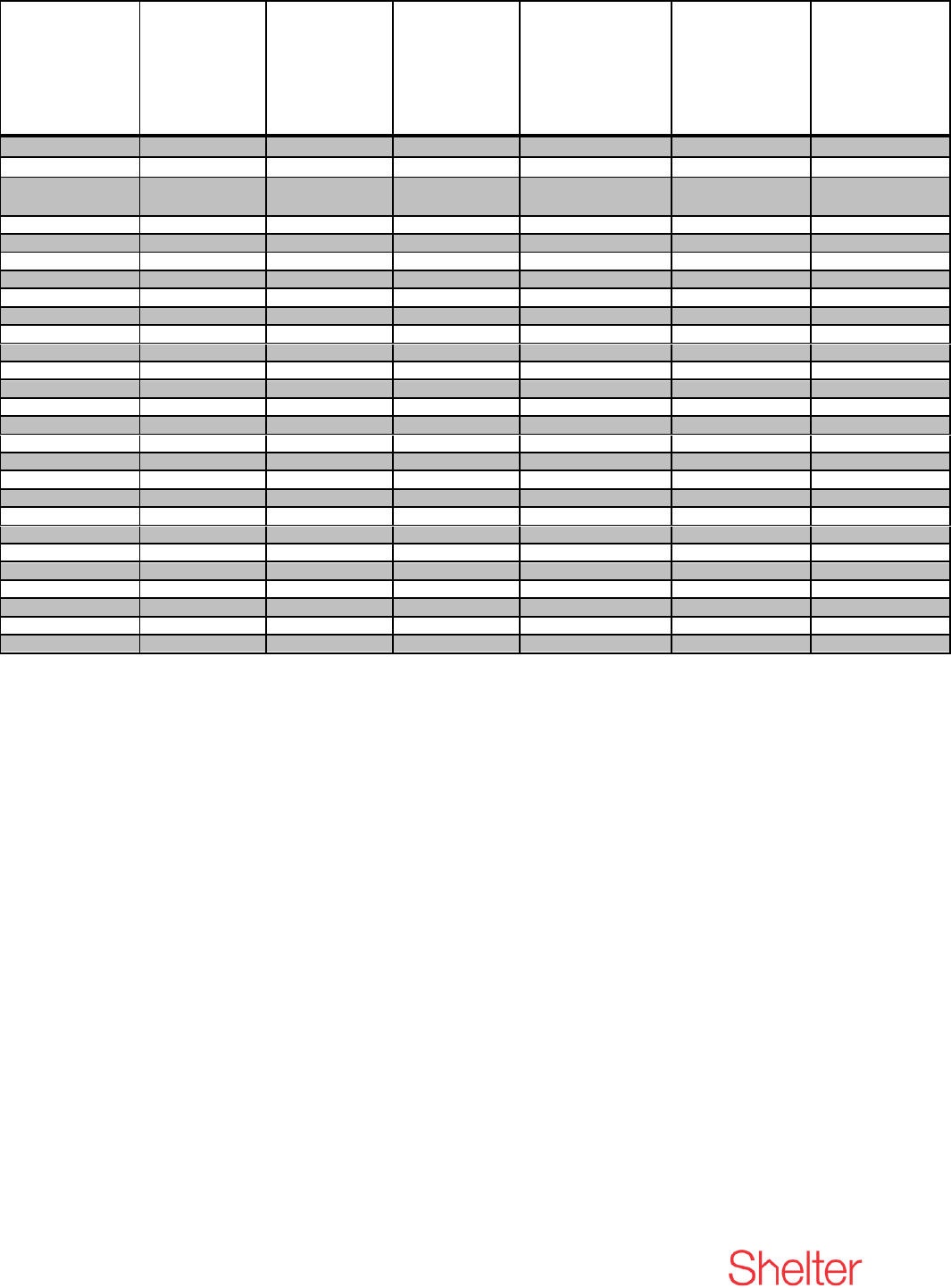
The affordability of private renting – small families claiming local housing allowance
DOWNLOADED FROM THE SHELTER WEBSITE www.shelter.org.uk
© 2012 Shelter
22
Region/ local
authority
25th% rent per
month, October
2010 -
September
2011: 2
bedroom
homes [1]
Maximum rate of
LHA per month:
2 bedroom
homes [2]
Difference
between
maximum LHA
rate and 25th%
rent: 2 bedroom
homes negative
figures mean a
shortfall [1&2]
Number of private
renting Housing
Benefit claimants [3]
Private renting
housing benefit
claimants as a %
of all households
[4]
Private renting
Housing Benefit
claimants as a %
of all privately
renting
households
(estimated) [5]
Yorkshire and
Humber
Barnsley
£368
£375
£7
6,490
2.9%
39%
Bradford
£400
£425
£25
17,680
3.4%
46%
Calderdale
£425
£425
£0
6,430
3.2%
45%
Craven
£460
£425
-£35
1,030
1.9%
28%
Doncaster
£395
£400
£5
9,470
3.3%
49%
East Riding Yorks
£412
£368
-£44
8,340
2.5%
43%
Hambleton
£475
£475
£0
1,220
1.4%
20%
Harrogate
£575
£575
£0
3,140
2.0%
27%
Kingston upon Hull
£350
£368
£18
9,590
3.6%
50%
Kirklees
£399
£400
£1
11,530
2.8%
35%
Leeds
£500
£495
-£5
19,330
2.4%
28%
N E Lincolnshire
£390
£390
£0
7,600
4.8%
73%
North Lincolnshire
£385
£390
£5
4,120
2.6%
49%
Richmondshire
£450
£475
£25
830
1.6%
11%
Rotherham
£400
£395
-£5
5,800
2.3%
34%
Ryedale
£450
£425
-£25
850
1.6%
21%
Scarborough
£425
£425
£0
4,890
4.5%
52%
Selby
£450
£525
£75
1,330
1.6%
41%
Sheffield
£450
£450
£0
9,420
1.7%
17%
Wakefield
£450
£450
£0
6,710
2.1%
40%
York
£575
£525
-£50
2,920
1.4%
23%
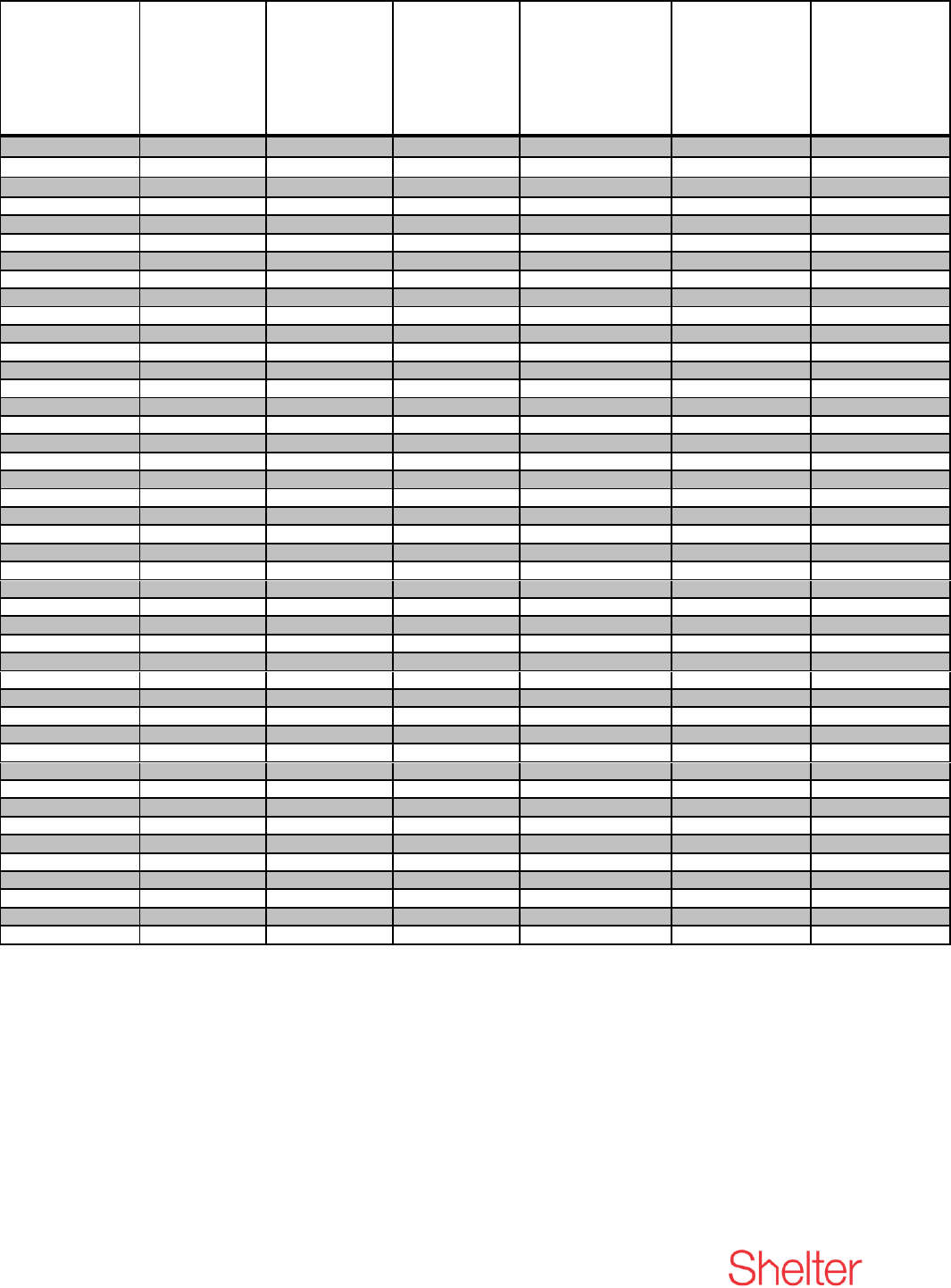
The affordability of private renting – small families claiming local housing allowance
DOWNLOADED FROM THE SHELTER WEBSITE www.shelter.org.uk
© 2012 Shelter
23
Region/ local
authority
25th% rent per
month, October
2010 -
September
2011: 2
bedroom
homes [1]
Maximum rate of
LHA per month:
2 bedroom
homes [2]
Difference
between
maximum LHA
rate and 25th%
rent: 2 bedroom
homes negative
figures mean a
shortfall [1&2]
Number of private
renting Housing
Benefit claimants [3]
Private renting
housing benefit
claimants as a %
of all households
[4]
Private renting
Housing Benefit
claimants as a %
of all privately
renting
households
(estimated) [5]
East Midlands
Amber Valley
£425
£435
£10
2,550
2.1%
38%
Ashfield
£385
£395
£10
3,010
2.6%
50%
Bassetlaw
£395
£395
£0
2,500
2.2%
38%
Blaby
£495
£475
-£20
1,240
1.3%
43%
Bolsover
£395
£395
£0
2,190
2.9%
50%
Boston
£450
£450
£0
1,440
2.4%
34%
Broxtowe
£450
£450
£0
2,180
1.9%
26%
Charnwood
£450
£475
£25
2,200
1.3%
22%
Chesterfield
£425
£425
£0
2,600
2.6%
50%
Corby
£425
£450
£25
1,670
3.0%
82%
Daventry
£495
£510
£15
910
1.2%
25%
Derby
£435
£435
£0
6,410
2.6%
43%
Derbyshire Dales
£475
£475
£0
1,010
1.4%
20%
East Lindsey
£390
£390
£0
5,730
4.0%
40%
East Northants
£450
£450
£0
1,260
1.5%
31%
Erewash
£420
£435
£15
2,880
2.6%
44%
Gedling
£450
£450
£0
2,640
2.3%
43%
Harborough
£495
£475
-£20
990
1.2%
27%
High Peak
£450
£475
£25
2,290
2.5%
44%
Hinckley & Boswth
£450
£475
£25
1,650
1.6%
38%
Kettering
£450
£450
£0
2,140
2.4%
43%
Leicester
£475
£475
£0
10,570
3.4%
36%
Lincoln
£450
£425
-£25
2,940
3.3%
35%
Mansfield
£395
£395
£0
2,840
2.9%
47%
Melton
£425
£475
£50
750
1.5%
21%
Newark & Shwood
£425
£420
-£5
2,030
1.8%
35%
N E Derbyshire
£400
£425
£25
1,150
1.2%
35%
North Kesteven
£443
£425
-£18
1,840
1.7%
24%
N W Leics
£450
£475
£25
1,400
1.5%
34%
Northampton
£503
£510
£7
5,430
2.6%
42%
Nottingham
£450
£450
£0
10,190
3.3%
27%
Oadby & Wigston
N/A
£475
N/A
920
1.6%
46%
Rushcliffe
£495
£450
-£45
1,440
1.3%
18%
Rutland
N/A
£475
N/A
400
1.0%
14%
South Derbyshire
£450
£445
-£5
1,860
2.0%
45%
South Holland
£450
£450
£0
1,700
2.0%
41%
South Kesteven
£425
£420
-£5
2,780
2.1%
29%
South Northants
£550
£510
-£40
710
0.8%
17%
Wellingborough
£425
£450
£25
1,380
1.8%
42%
West Lindsey
£350
£425
£75
2,440
2.7%
36%
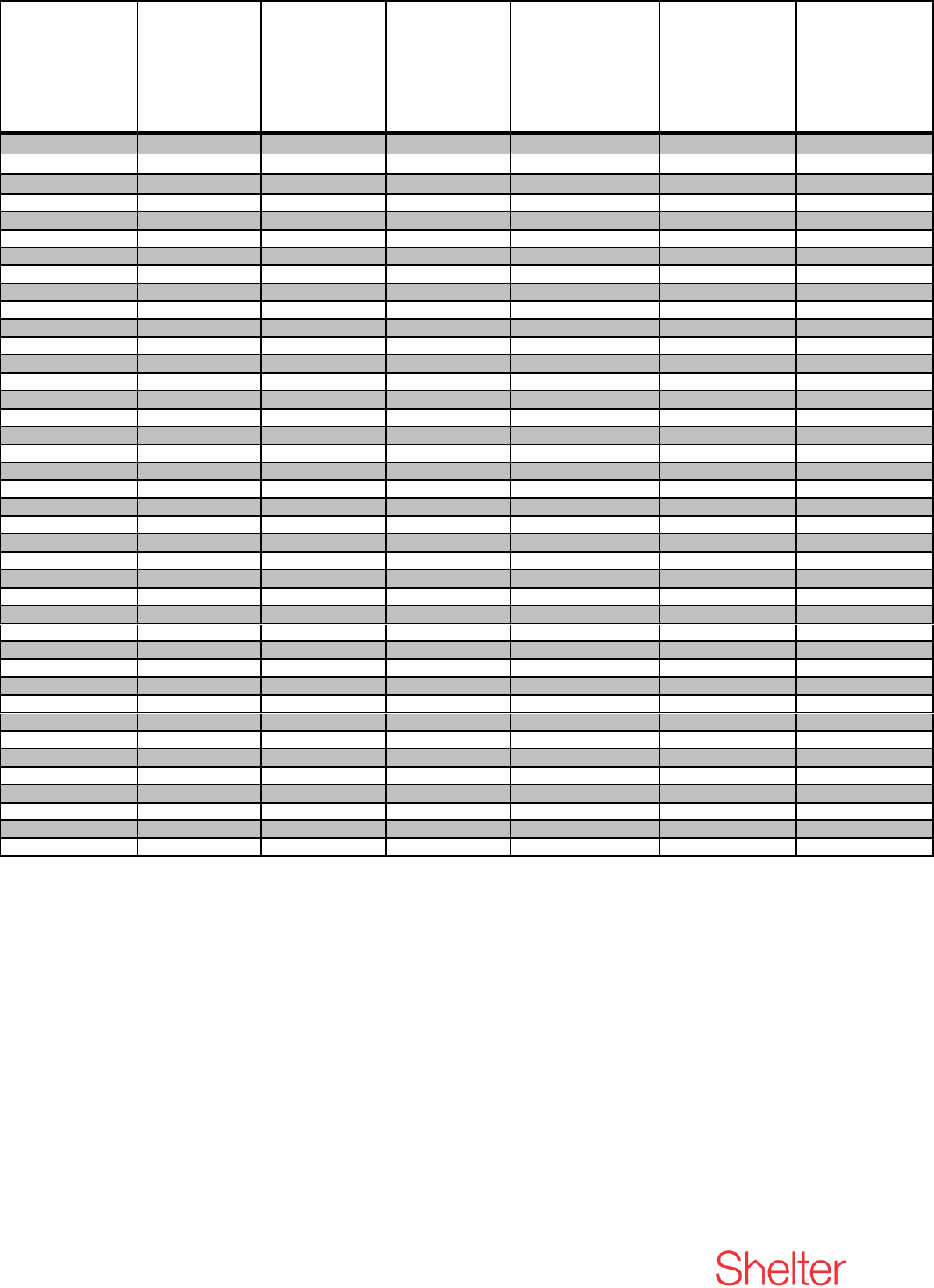
The affordability of private renting – small families claiming local housing allowance
DOWNLOADED FROM THE SHELTER WEBSITE www.shelter.org.uk
© 2012 Shelter
24
Region/ local
authority
25th% rent per
month, October
2010 -
September
2011: 2
bedroom
homes [1]
Maximum rate of
LHA per month:
2 bedroom
homes [2]
Difference
between
maximum LHA
rate and 25th%
rent: 2 bedroom
homes negative
figures mean a
shortfall [1&2]
Number of private
renting Housing
Benefit claimants [3]
Private renting
housing benefit
claimants as a %
of all households
[4]
Private renting
Housing Benefit
claimants as a %
of all privately
renting
households
(estimated) [5]
West Midlands
Birmingham
£495
£500
£5
34,490
3.3%
49%
Bromsgrove
£550
£485
-£65
920
1.0%
31%
Cannock Chase
£450
£494
£44
2,160
2.3%
59%
Coventry
£450
£450
£0
11,050
3.5%
47%
Dudley
£450
£450
£0
6,050
2.0%
58%
East Staffordshire
£425
£445
£20
2,710
2.5%
44%
Herefordshire
£495
£495
£0
3,780
2.1%
27%
Lichfield
£495
£494
-£1
1,100
1.1%
26%
Malvern Hills
£495
£525
£30
1,120
1.5%
24%
Newcastle-u-Lyme
£425
£390
-£35
1,800
1.4%
34%
North Warwicks
£495
£494
-£1
1,150
1.9%
36%
N‟eaton & Bedwth
£425
£450
£25
3,300
2.7%
60%
Redditch
£510
£485
-£25
1,280
1.6%
50%
Rugby
£470
£475
£5
1,780
1.9%
34%
Sandwell
£450
£450
£0
7,920
2.7%
62%
Shropshire
£450
£475
£25
5,580
1.9%
22%
Solihull
£595
£595
£0
3,400
1.6%
49%
South Staffs
£475
£450
-£25
1,120
1.1%
31%
Stafford
£475
£494
£19
1,630
1.3%
23%
Staffs Moorlands
£399
£390
-£9
1,340
1.4%
31%
Stoke-on-Trent
£375
£390
£15
8,070
3.4%
54%
Stratford-on-Avon
£585
£595
£10
1,840
1.5%
25%
Tamworth
£500
£494
-£6
1,340
1.8%
56%
Telford & Wrekin
£475
£475
£0
5,200
3.2%
53%
Walsall
£432
£450
£18
6,590
2.6%
61%
Warwick
£595
£595
£0
2,000
1.4%
21%
Wolverhampton
£450
£450
£0
7,410
3.1%
55%
Worcester
£550
£525
-£25
2,270
2.4%
35%
Wychavon
£525
£525
£0
1,460
1.2%
25%
Wyre Forest
£460
£485
£25
2,680
2.7%
54%
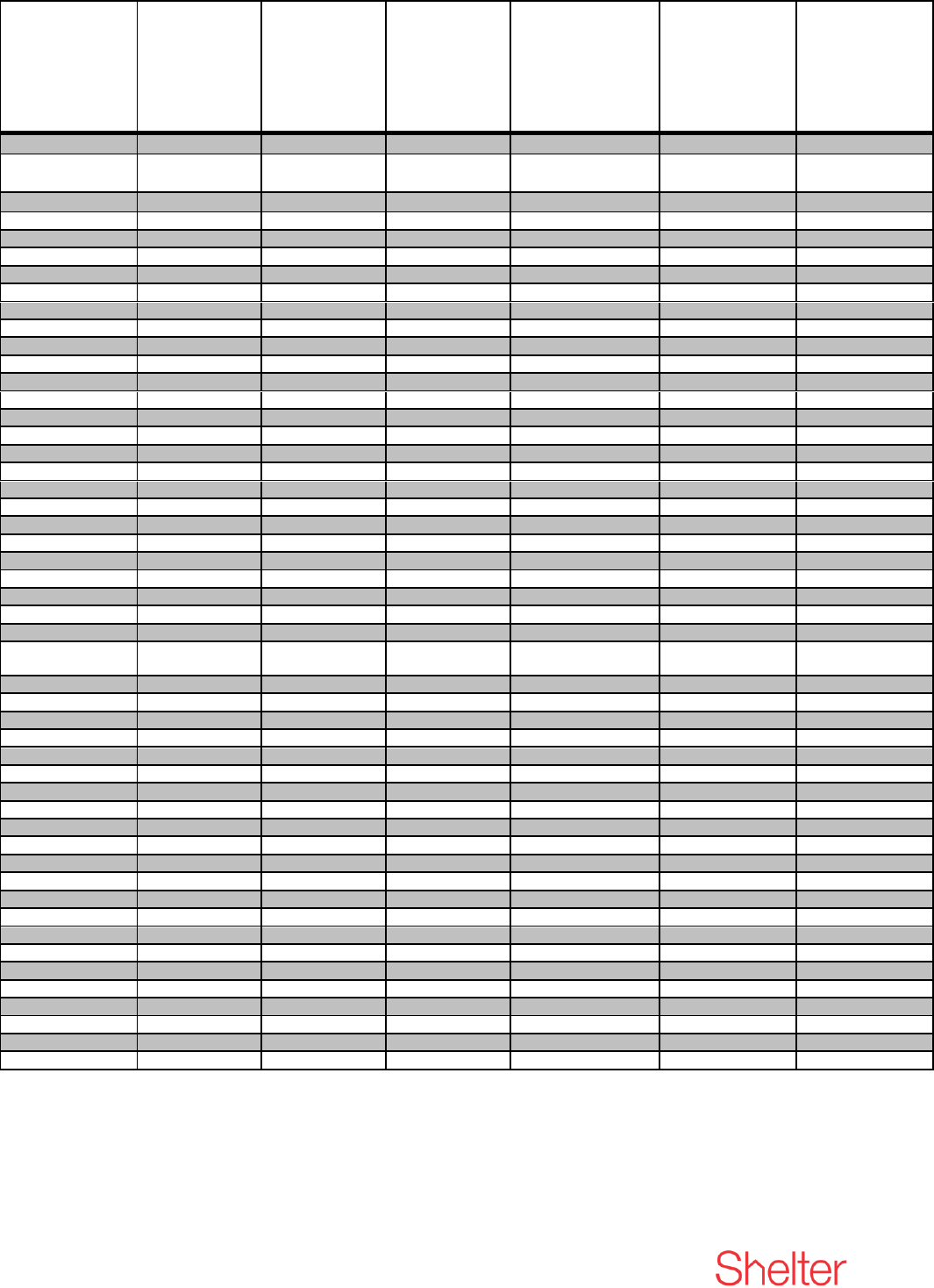
The affordability of private renting – small families claiming local housing allowance
DOWNLOADED FROM THE SHELTER WEBSITE www.shelter.org.uk
© 2012 Shelter
25
Region/ local
authority
25th% rent per
month, October
2010 -
September
2011: 2
bedroom
homes [1]
Maximum rate of
LHA per month:
2 bedroom
homes [2]
Difference
between
maximum LHA
rate and 25th%
rent: 2 bedroom
homes negative
figures mean a
shortfall [1&2]
Number of private
renting Housing
Benefit claimants [3]
Private renting
housing benefit
claimants as a %
of all households
[4]
Private renting
Housing Benefit
claimants as a %
of all privately
renting
households
(estimated) [5]
East of
England
Babergh
£500
£475
-£25
1,380
1.6%
29%
Basildon
£675
£650
-£25
3,430
2.0%
51%
Bedford
£525
£545
£20
3,490
2.2%
30%
Braintree
£550
£625
£75
2,520
1.8%
37%
Breckland
£450
£485
£35
2,660
2.0%
30%
Brentwood
£725
£650
-£75
880
1.2%
23%
Broadland
£500
£485
-£15
1,590
1.3%
26%
Broxbourne
£750
£750
£0
2,000
2.2%
54%
Cambridge
£775
£575
-£200
1,260
1.0%
8%
Castle Point
£650
£600
-£50
2,730
3.1%
87%
Central Beds
£550
£545
-£5
3,490
1.4%
29%
Chelmsford
£650
£625
-£25
2,330
1.4%
30%
Colchester
£565
£550
-£15
4,210
2.3%
36%
Dacorum
£700
£795
£95
1,930
1.4%
33%
East Cambs
£525
£575
£50
1,030
1.2%
20%
East Herts
£725
£625
-£100
1,490
1.1%
19%
Epping Forest
£795
£675
-£120
1,940
1.6%
32%
Fenland
£450
£475
£25
2,760
3.0%
51%
Forest Heath
£525
£500
-£25
1,190
1.9%
17%
Great Yarmouth
£445
£450
£5
4,580
4.7%
66%
Harlow
£675
£675
£0
1,660
2.0%
52%
Hertsmere
£775
£795
£20
1,540
1.5%
34%
Huntingdonshire
£525
£525
£0
2,080
1.2%
20%
Ipswich
£450
£475
£25
4,190
3.3%
46%
King‟s Lynn &
West Norfolk
£475
£475
£0
3,400
2.4%
28%
Luton
£575
£595
£20
7,010
3.5%
43%
Maldon
£625
£625
£0
1,100
1.7%
41%
Mid Suffolk
£475
£475
£0
1,200
1.3%
22%
North Herts
£600
£625
£25
1,540
1.2%
20%
North Norfolk
£465
£485
£20
2,390
2.4%
27%
Norwich
£495
£485
-£10
3,110
2.2%
24%
Peterborough
£475
£475
£0
5,550
3.2%
49%
Rochford
£675
£600
-£75
1,420
1.7%
51%
South Cambs
£650
£575
-£75
1,180
0.8%
15%
South Norfolk
£450
£485
£35
1,790
1.5%
28%
S‟end-on-Sea
£595
£600
£5
10,170
6.2%
55%
St Albans
£800
£795
-£5
1,410
1.0%
17%
St Edmundsbury
£538
£500
-£38
1,510
1.4%
21%
Stevenage
£675
£625
-£50
1,350
1.7%
56%
Suffolk Coastal
£450
£475
£25
2,230
1.8%
24%
Tendring
£525
£550
£25
7,480
5.0%
71%
Three Rivers
£850
£795
-£55
1,100
1.2%
31%
Thurrock
£650
£650
£0
4,200
2.6%
52%
Uttlesford
£650
£675
£25
910
1.2%
19%
Watford
£800
£795
-£5
2,230
2.6%
38%
Waveney
£440
£450
£10
4,370
3.7%
47%
Welwyn Hatfield
£730
£750
£20
930
0.8%
18%
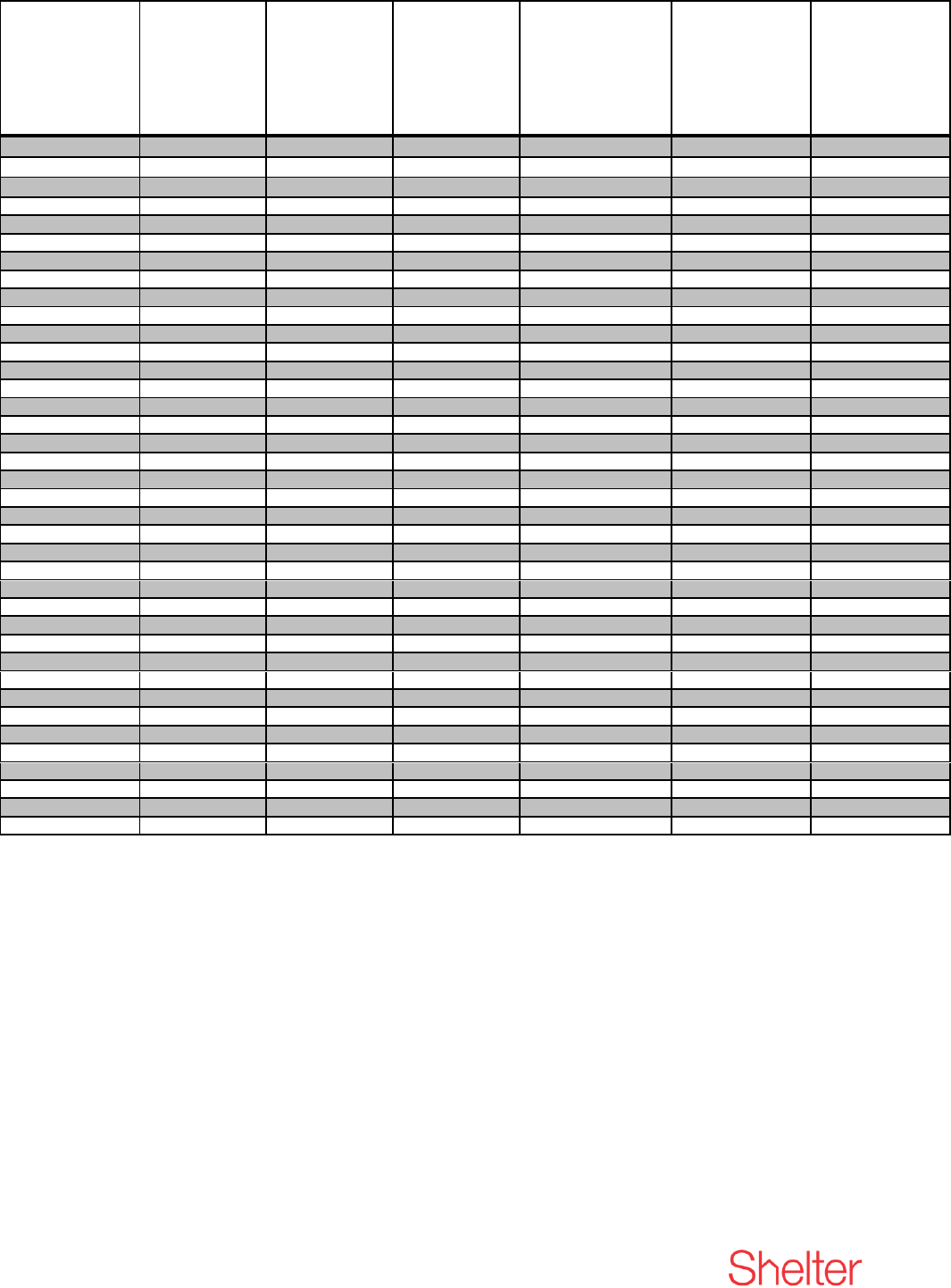
The affordability of private renting – small families claiming local housing allowance
DOWNLOADED FROM THE SHELTER WEBSITE www.shelter.org.uk
© 2012 Shelter
26
Region/ local
authority
25th% rent per
month, October
2010 -
September
2011: 2
bedroom
homes [1]
Maximum rate of
LHA per month:
2 bedroom
homes [2]
Difference
between
maximum LHA
rate and 25th%
rent: 2 bedroom
homes negative
figures mean a
shortfall [1&2]
Number of private
renting Housing
Benefit claimants [3]
Private renting
housing benefit
claimants as a %
of all households
[4]
Private renting
Housing Benefit
claimants as a %
of all privately
renting
households
(estimated) [5]
London
Barking & Dag
£795
£800
£5
6,930
3.9%
85%
Barnet
£1,018
£970
-£48
14,750
4.2%
36%
Bexley
£750
£800
£50
5,090
2.2%
42%
Brent
£1,050
£900
-£150
16,580
6.5%
40%
Bromley
£850
£800
-£50
5,760
1.8%
27%
Camden
£1,582
£1,257
-£325
4,970
2.1%
14%
Croydon
£850
£800
-£50
16,940
4.9%
47%
Ealing
£1,000
£1,213
£213
13,280
4.2%
30%
Enfield
£950
£970
£20
17,190
5.8%
75%
Greenwich
£800
£800
£0
5,760
2.5%
31%
Hackney
£1,170
£1,213
£43
10,310
4.7%
41%
Hamm & Fulham
£1,387
£1,213
-£173
4,580
2.7%
17%
Haringey
£1,049
£970
-£79
14,350
6.4%
37%
Harrow
£925
£900
-£25
9,190
4.0%
48%
Havering
£750
£800
£50
4,690
2.0%
45%
Hillingdon
£875
£875
£0
8,070
3.0%
41%
Hounslow
£900
£875
-£25
7,220
3.0%
29%
Islington
£1,408
£1,257
-£152
4,070
2.1%
15%
Ken. and Chelsea
£2,167
£1,257
-£910
4,060
2.4%
12%
Kingston
£995
£1,000
£5
3,770
2.2%
19%
Lambeth
£1,096
£995
-£101
8,860
3.1%
21%
Lewisham
£875
£995
£120
11,340
4.3%
42%
Merton
£950
£1,000
£50
7,870
3.8%
22%
Newham
£867
£867
£0
14,430
6.0%
53%
Redbridge
£825
£800
-£25
10,010
3.7%
44%
Richmond
£1,100
£1,000
-£100
2,970
1.6%
12%
Southwark
£1,100
£995
-£105
5,390
1.9%
20%
Sutton
£800
£800
£0
4,640
2.4%
32%
Tower Hamlets
£1,257
£1,213
-£43
5,630
2.4%
21%
Waltham Forest
£850
£867
£17
10,780
4.7%
38%
Wandsworth
£1,170
£1,213
£43
8,340
2.9%
16%
Westminster
£1,875
£1,257
-£618
8,660
3.4%
15%
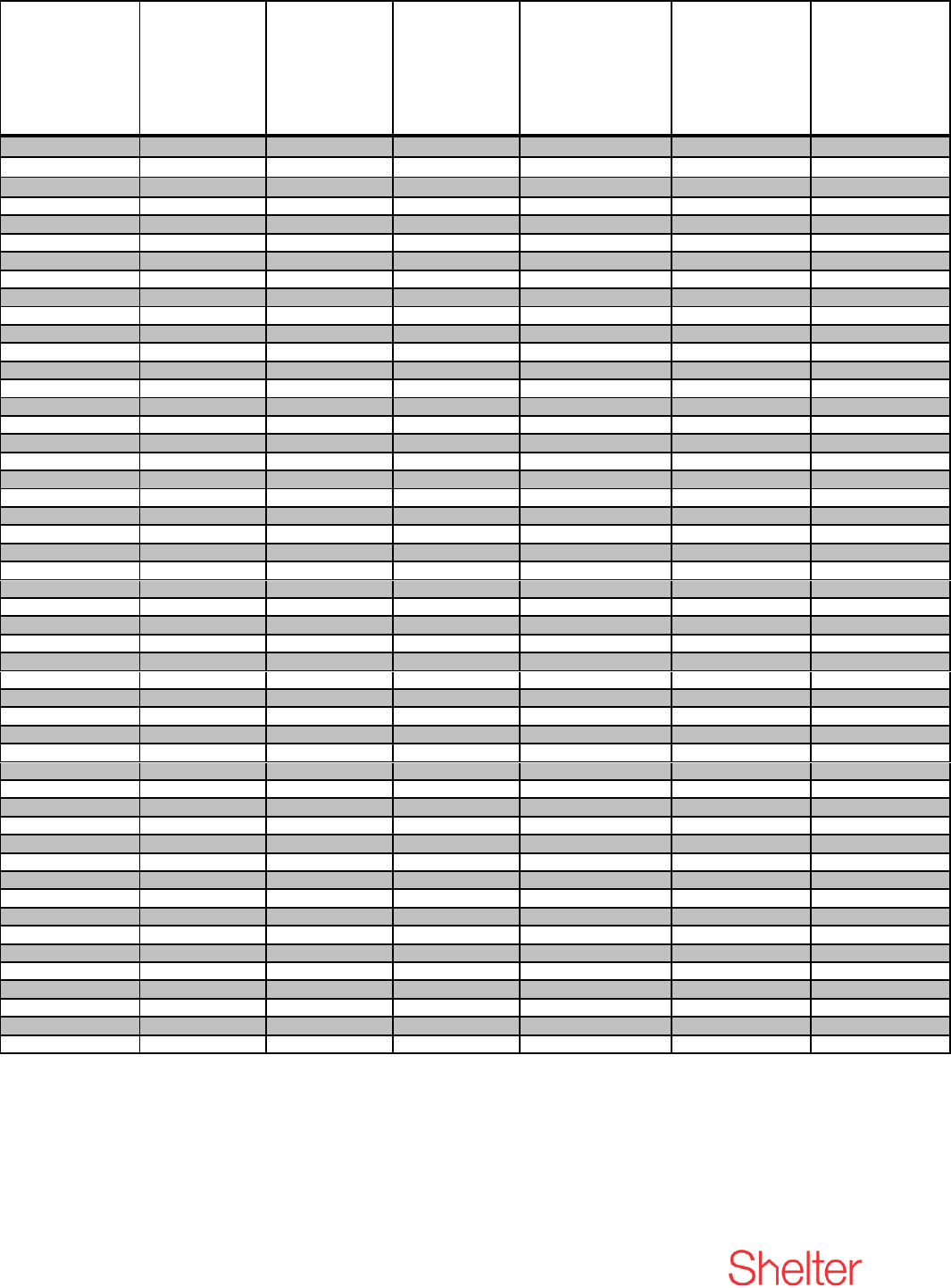
The affordability of private renting – small families claiming local housing allowance
DOWNLOADED FROM THE SHELTER WEBSITE www.shelter.org.uk
© 2012 Shelter
27
Region/ local
authority
25th% rent per
month, October
2010 -
September
2011: 2
bedroom
homes [1]
Maximum rate of
LHA per month:
2 bedroom
homes [2]
Difference
between
maximum LHA
rate and 25th%
rent: 2 bedroom
homes negative
figures mean a
shortfall [1&2]
Number of private
renting Housing
Benefit claimants [3]
Private renting
housing benefit
claimants as a %
of all households
[4]
Private renting
Housing Benefit
claimants as a %
of all privately
renting
households
(estimated) [5]
South East
Adur
£650
£650
£0
1,530
2.5%
61%
Arun
£625
£650
£25
5,360
3.6%
48%
Ashford
£600
£595
-£5
2,420
2.1%
39%
Aylesbury Vale
£625
£625
£0
2,200
1.3%
25%
Basingstoke & Dn
£700
£695
-£5
1,800
1.1%
23%
Bracknell Forest
£750
£750
£0
1,580
1.4%
27%
Brighton and Hove
£825
£775
-£50
13,740
5.3%
33%
Canterbury
£625
£650
£25
3,820
2.5%
29%
Cherwell
£645
£625
-£20
2,680
1.9%
29%
Chichester
£693
£685
-£8
2,070
1.8%
23%
Chiltern
£775
£725
-£50
900
1.0%
23%
Crawley
£750
£750
£0
2,560
2.4%
51%
Dartford
£640
£600
-£40
1,870
2.0%
35%
Dover
£500
£505
£5
3,950
3.7%
47%
East Hampshire
£650
£695
£45
1,170
1.0%
19%
Eastbourne
£650
£650
£0
5,210
5.4%
50%
Eastleigh
£650
£650
£0
1,770
1.4%
38%
Elmbridge
£875
£850
-£25
1,960
1.5%
22%
Epsom and Ewell
£895
£800
-£95
1,300
1.7%
30%
Fareham
£625
£595
-£30
1,310
1.2%
33%
Gosport
£575
£595
£20
2,010
2.5%
40%
Gravesham
£575
£600
£25
2,730
2.7%
46%
Guildford
£890
£850
-£40
1,810
1.3%
16%
Hart
£750
£695
-£55
840
0.9%
17%
Hastings
£475
£500
£25
6,640
7.6%
56%
Havant
£624
£595
-£29
2,350
2.0%
52%
Horsham
£695
£750
£55
1,670
1.3%
27%
Isle of Wight
£520
£525
£5
5,870
4.2%
51%
Lewes
£695
£775
£80
2,880
3.0%
49%
Maidstone
£625
£650
£25
3,040
2.0%
40%
Medway
£550
£550
£0
9,860
3.8%
56%
Mid Sussex
£750
£750
£0
1,890
1.4%
28%
Milton Keynes
£625
£603
-£22
7,150
3.0%
60%
Mole Valley
£840
£750
-£90
1,050
1.2%
23%
New Forest
£650
£650
£0
3,070
1.7%
35%
Oxford
£850
£775
-£75
3,550
2.3%
19%
Portsmouth
£595
£595
£0
7,720
3.7%
38%
Reading
£750
£750
£0
5,830
3.8%
33%
R‟gate & Banstead
£775
£750
-£25
1,910
1.4%
26%
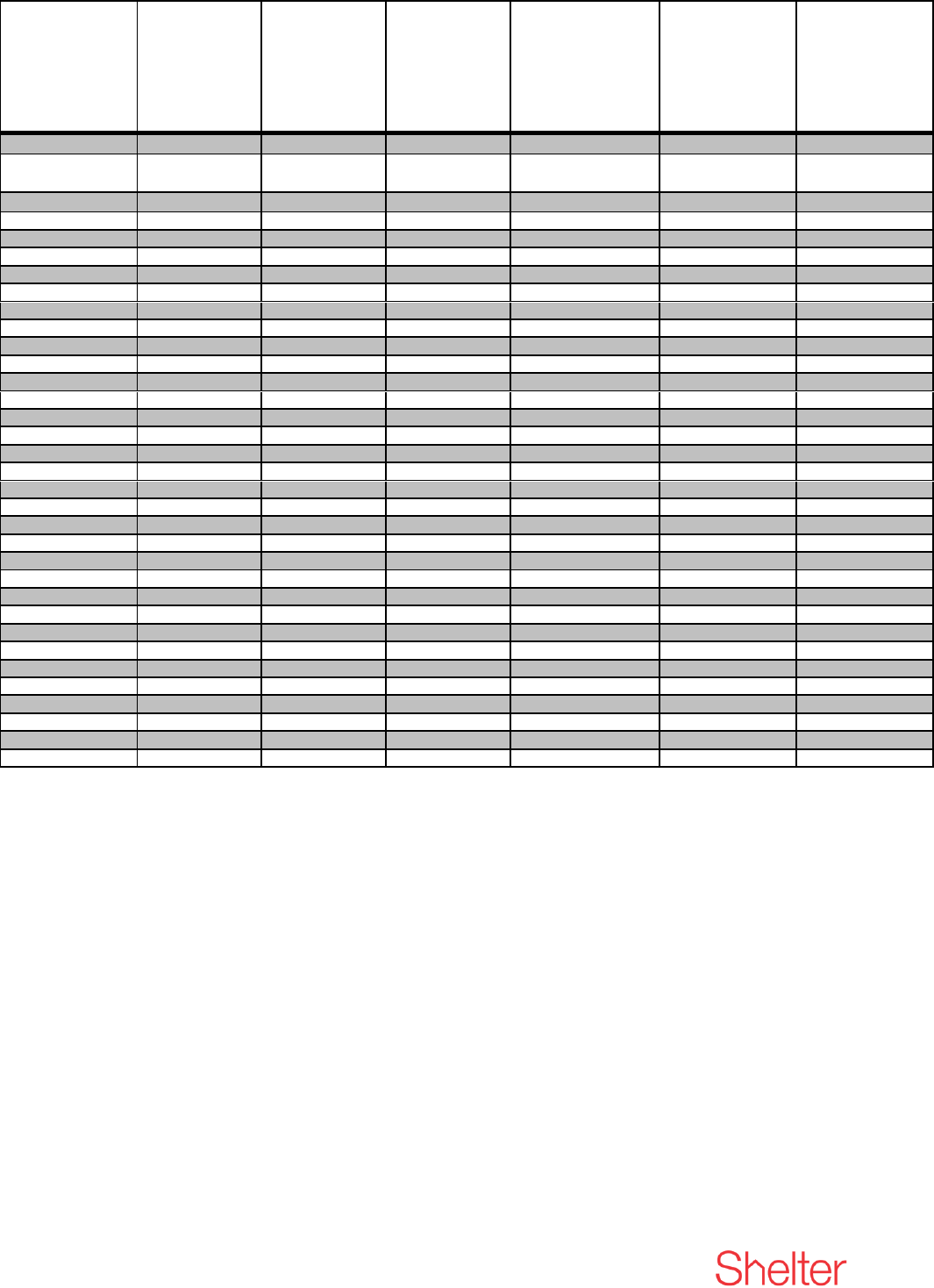
The affordability of private renting – small families claiming local housing allowance
DOWNLOADED FROM THE SHELTER WEBSITE www.shelter.org.uk
© 2012 Shelter
28
Region/ local
authority
25th% rent per
month, October
2010 -
September
2011: 2
bedroom
homes [1]
Maximum rate of
LHA per month:
2 bedroom
homes [2]
Difference
between
maximum LHA
rate and 25th%
rent: 2 bedroom
homes negative
figures mean a
shortfall [1&2]
Number of private
renting Housing
Benefit claimants [3]
Private renting
housing benefit
claimants as a %
of all households
[4]
Private renting
Housing Benefit
claimants as a %
of all privately
renting
households
(estimated) [5]
South East
(cont.)
Rother
£550
£500
-£50
2,680
3.0%
46%
Runnymede
£850
£850
£0
1,220
1.4%
24%
Rushmoor
£700
£725
£25
2,390
2.6%
26%
Sevenoaks
£770
£745
-£25
1,220
1.1%
25%
Shepway
£495
£505
£10
5,080
5.0%
51%
Slough
£750
£775
£25
4,730
3.6%
53%
South Bucks
£800
£775
-£25
670
1.0%
20%
South Oxfordshire
£725
£775
£50
1,600
1.2%
17%
Southampton
£650
£650
£0
7,390
3.1%
27%
Spelthorne
£850
£850
£0
1,580
1.7%
29%
Surrey Heath
£795
£725
-£70
880
1.0%
15%
Swale
£550
£550
£0
4,440
3.3%
56%
Tandridge
£800
£750
-£50
1,280
1.5%
31%
Test Valley
£650
£695
£45
1,400
1.2%
20%
Thanet
£470
£475
£5
9,030
6.8%
65%
Tonbridge & Mall‟
£650
£745
£95
1,460
1.2%
30%
Tunbridge Wells
£750
£745
-£5
1,830
1.7%
23%
Vale White Horse
£695
£775
£80
1,290
1.1%
15%
Waverley
£795
£850
£55
1,360
1.1%
20%
Wealden
£650
£650
£0
2,890
2.0%
44%
West Berkshire
£650
£650
£0
2,170
1.4%
24%
West Oxfordshire
£675
£775
£100
1,410
1.4%
18%
Winchester
£725
£750
£25
1,260
1.1%
16%
Windsor & Mhead
£900
£775
-£125
1,600
1.1%
15%
Woking
£850
£850
£0
1,520
1.6%
22%
Wokingham
£795
£750
-£45
1,590
1.0%
20%
Worthing
£650
£650
£0
3,590
3.5%
42%
Wycombe
£725
£725
£0
2,470
1.5%
24%
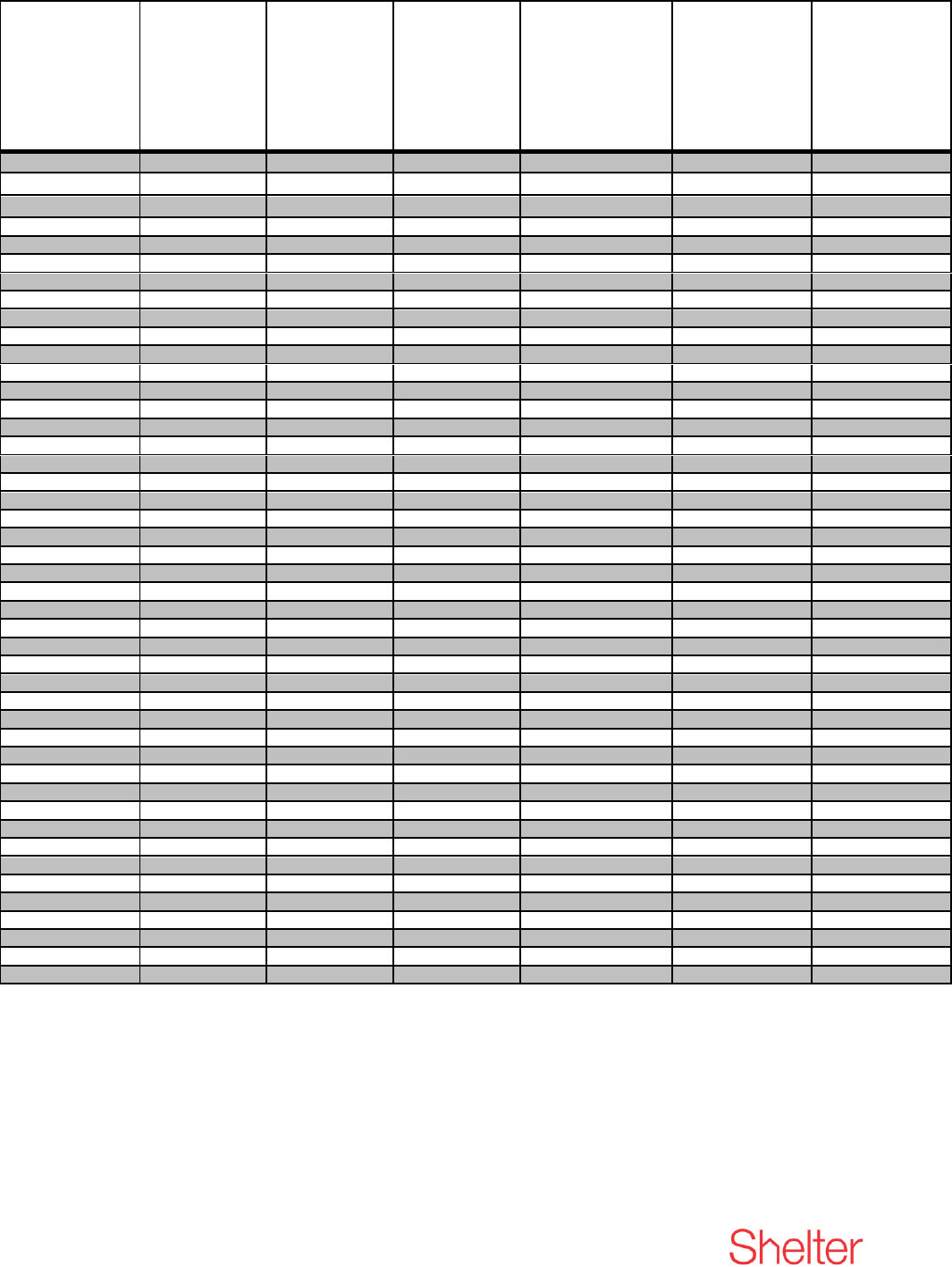
The affordability of private renting – small families claiming local housing allowance
DOWNLOADED FROM THE SHELTER WEBSITE www.shelter.org.uk
© 2012 Shelter
29
Region/ local
authority
25th% rent per
month, October
2010 -
September
2011: 2
bedroom
homes [1]
Maximum rate of
LHA per month:
2 bedroom
homes [2]
Difference
between
maximum LHA
rate and 25th%
rent: 2 bedroom
homes,
negative figures
mean a shortfall
[1&2]
Number of private
renting Housing
Benefit claimants [3]
Private renting
housing benefit
claimants as a %
of all households
[4]
Private renting
Housing Benefit
claimants as a %
of all privately
renting
households
(estimated) [5]
South West
Bath & N E Soms
£650
£675
£25
3,180
1.8%
21%
Bournemouth
£650
£650
£0
10,940
6.5%
48%
Bristol
£625
£600
-£25
14,060
3.2%
35%
Cheltenham
£600
£595
-£5
2,610
2.3%
26%
Christchurch
£650
£650
£0
1,210
2.6%
57%
Cornwall
£525
£550
£25
19,820
3.7%
39%
Cotswold
£613
£595
-£18
1,240
1.5%
19%
East Devon
£550
£525
-£25
3,310
2.5%
34%
East Dorset
£650
£650
£0
1,470
1.7%
40%
Exeter
£628
£580
-£48
3,130
2.6%
28%
Forest of Dean
£495
£500
£5
1,710
2.1%
45%
Gloucester
£500
£500
£0
4,020
3.4%
53%
Isles of Scilly
N/A
£550
N/A
N/A
N/A
N/A
Mendip
£525
£525
£0
2,600
2.4%
34%
Mid Devon
£500
£525
£25
1,810
2.4%
27%
North Devon
£500
£495
-£5
3,480
3.8%
44%
North Dorset
£530
£575
£45
970
1.5%
20%
North Somerset
£535
£525
-£10
7,020
3.3%
52%
Plymouth
£510
£500
-£10
9,510
3.7%
39%
Poole
£650
£650
£0
4,480
3.2%
54%
Purbeck
£600
£650
£50
1,100
2.4%
28%
Sedgemoor
£475
£525
£50
3,570
3.2%
23%
South Glouc.
£595
£600
£5
4,350
1.6%
38%
South Hams
£525
£525
£0
1,890
2.3%
30%
South Somerset
£500
£525
£25
3,090
1.9%
29%
Stroud
£525
£500
-£25
1,990
1.8%
39%
Swindon
£525
£525
£0
4,720
2.3%
46%
Taunton Deane
£535
£525
-£10
2,480
2.3%
32%
Teignbridge
£525
£525
£0
4,000
3.1%
40%
Tewkesbury
£525
£595
£70
1,300
1.6%
32%
Torbay
£520
£525
£5
9,630
7.2%
58%
Torridge
£475
£495
£20
2,470
3.8%
44%
West Devon
£495
£580
£85
1,400
2.6%
30%
West Dorset
£565
£575
£10
1,820
1.9%
27%
West Somerset
£525
£525
£0
1,170
3.3%
38%
W‟mouth & p‟land
£575
£575
£0
2,960
4.7%
57%
Wiltshire
£550
£525
-£25
7,170
1.6%
21%
Contact: Liam_Reyno[email protected]
